This document is an introduction to a Ukrainian textbook for 7th grade students. It begins by welcoming the students back to school and encouraging them to share their summer holiday experiences with their classmates. It discusses the importance of family and spending time with friends. The introduction also provides an overview of the various topics that will be covered in the textbook, including family, health, sports, travel to different countries and cities, and learning English as a language of international communication. It wishes the students a productive school year as they embark on an educational journey through the textbook.
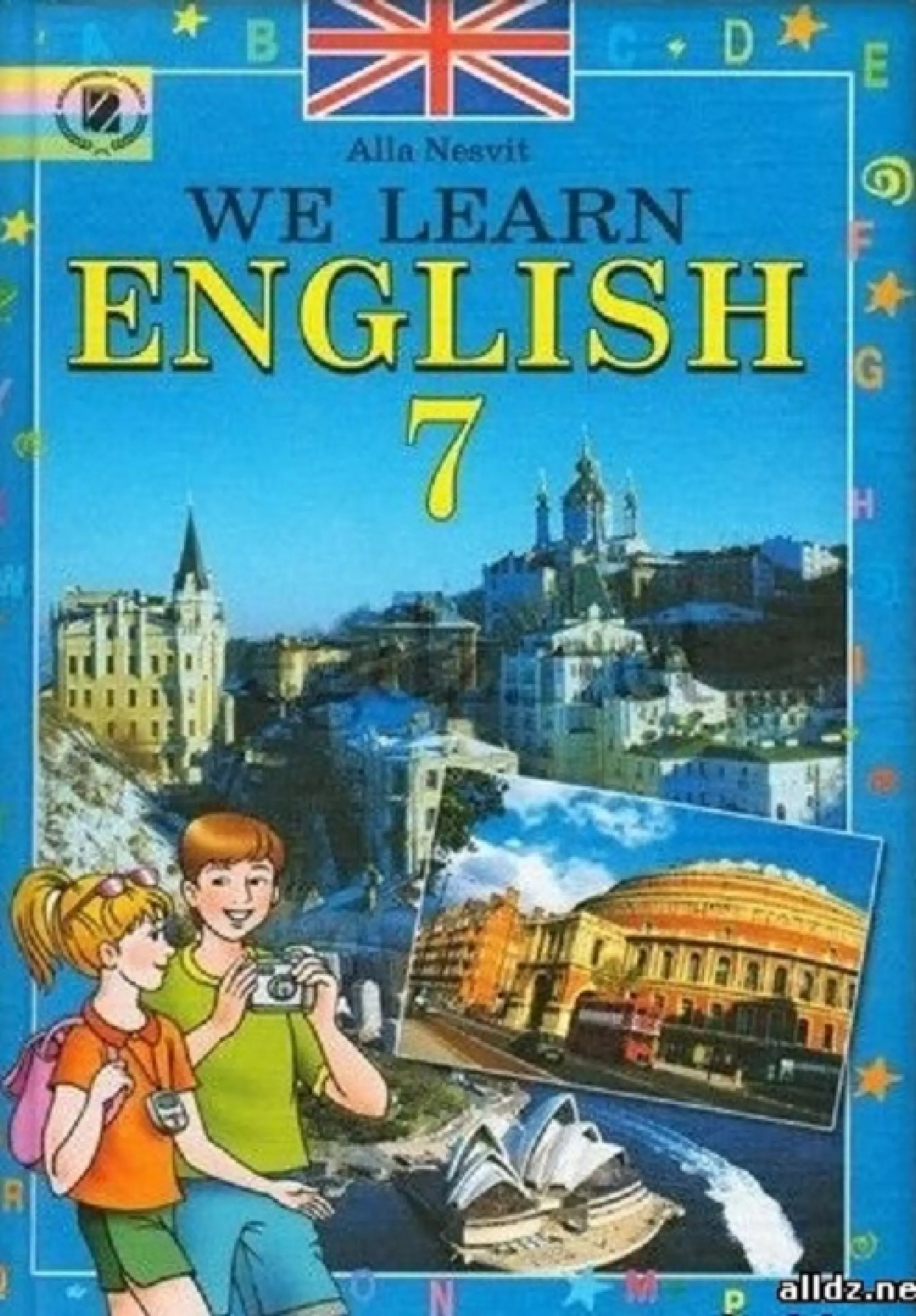
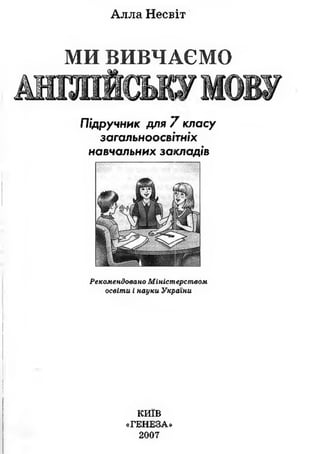
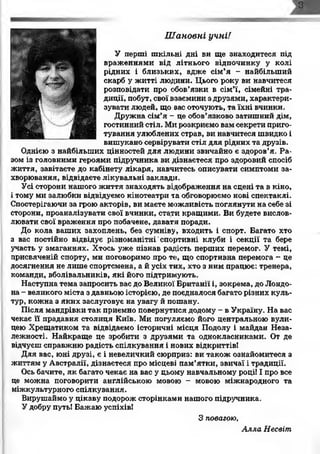
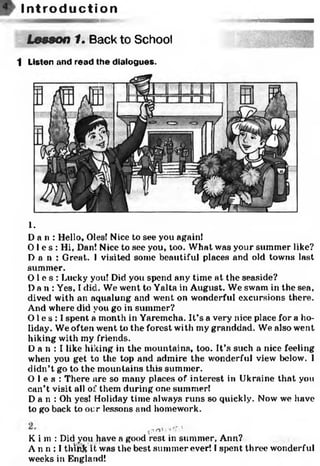
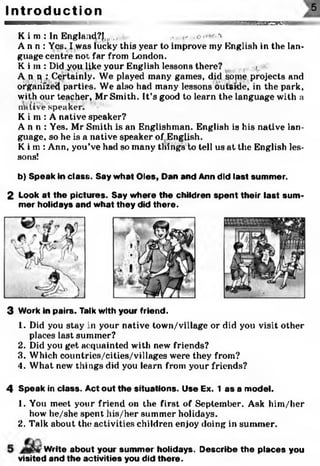
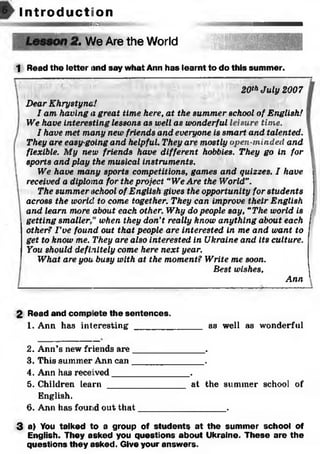
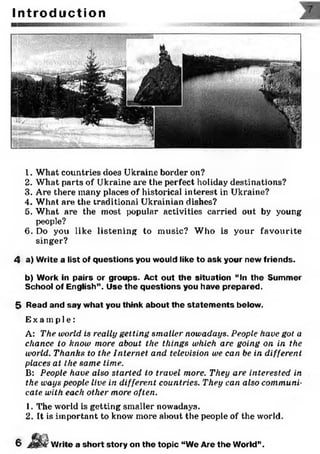
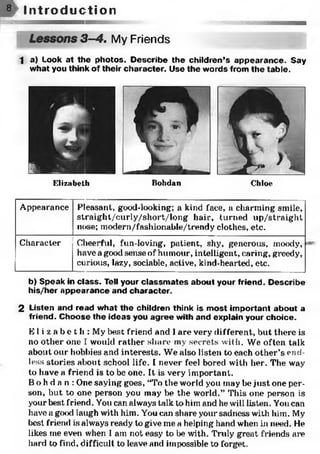
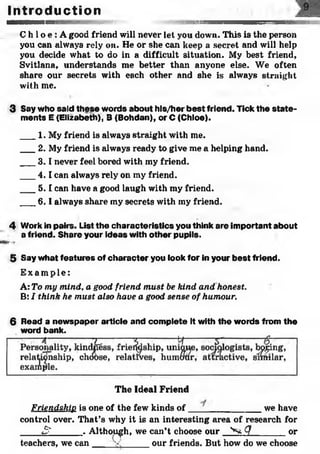
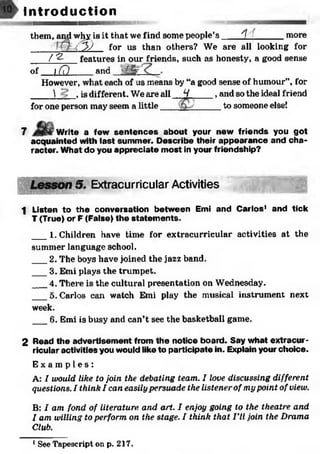
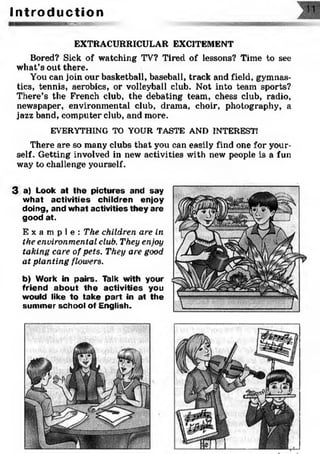
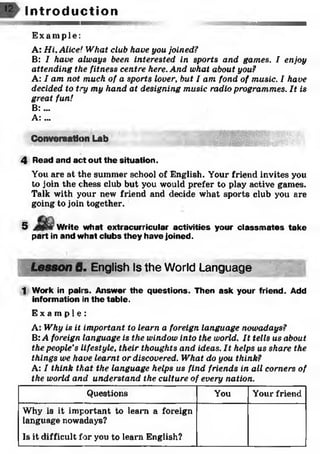
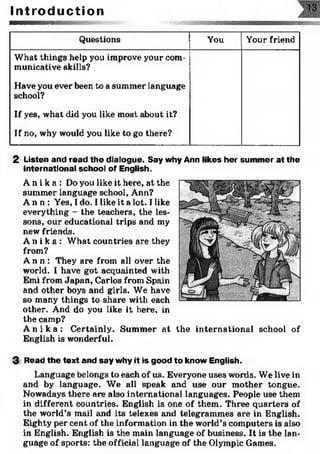
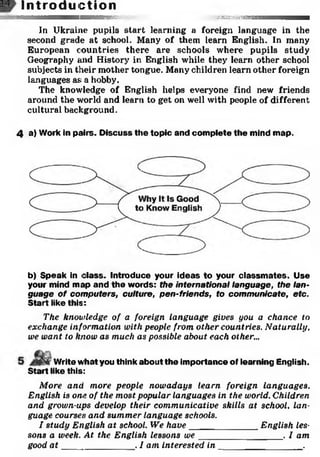
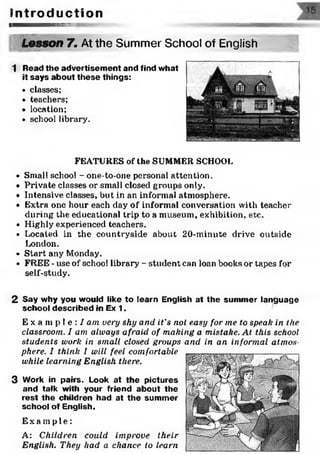
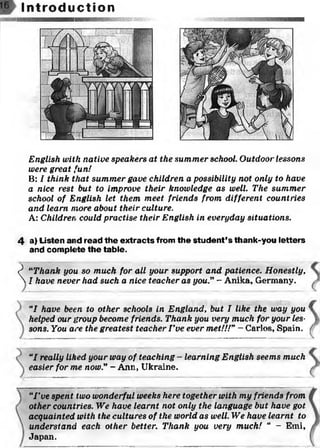
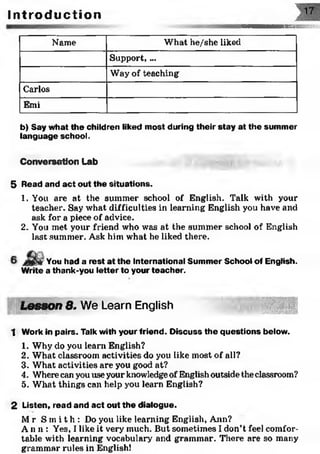
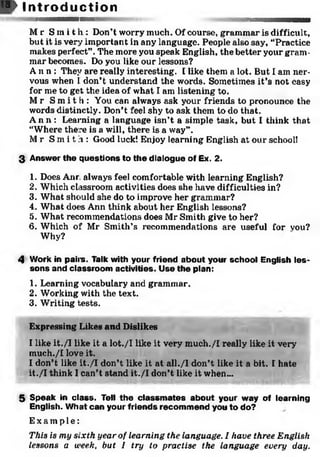
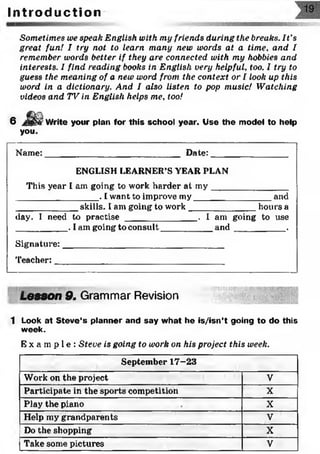
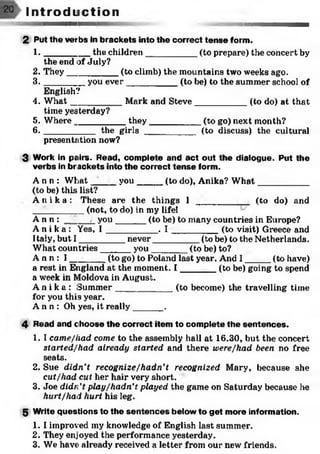
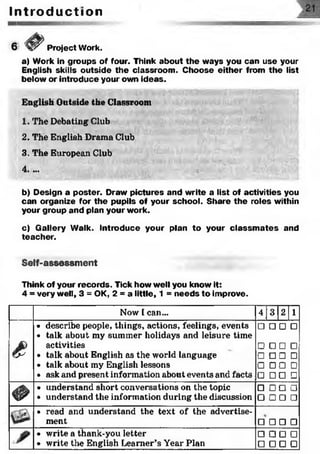
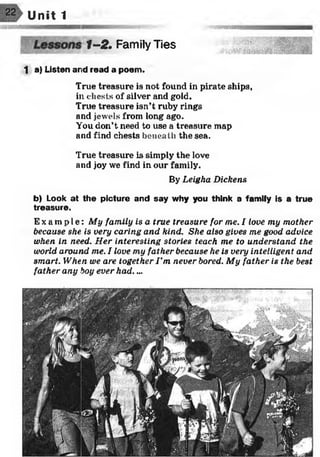
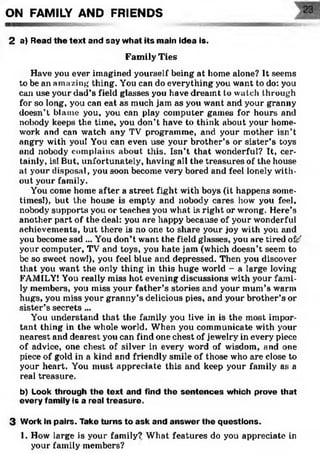
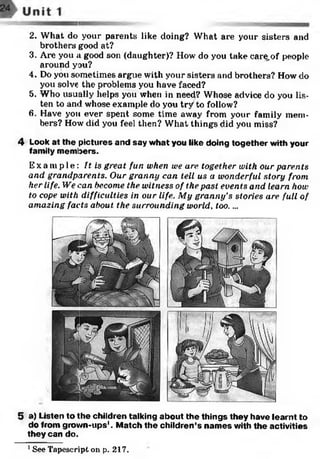
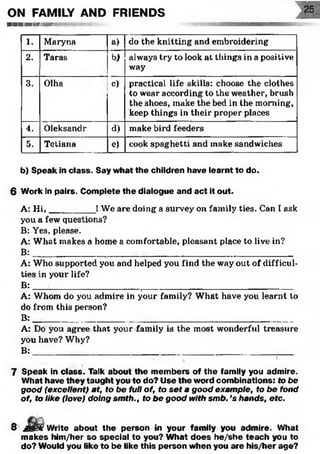
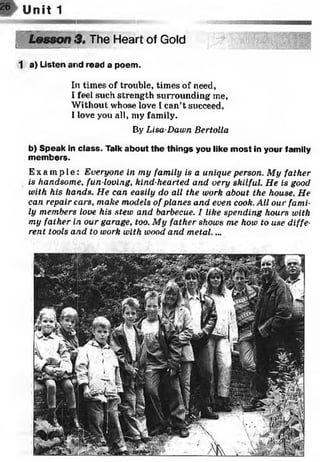
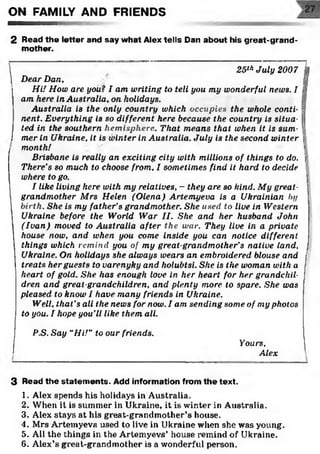
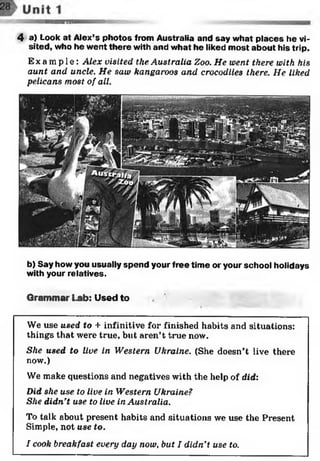
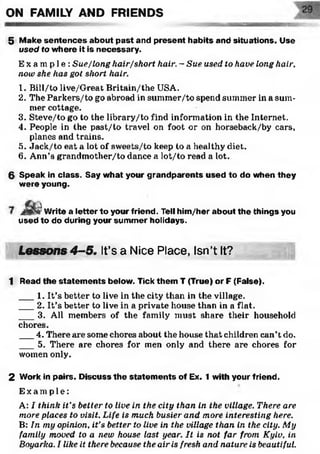
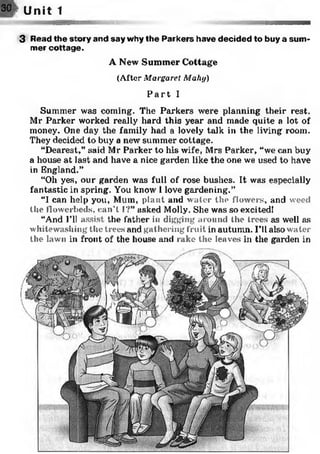
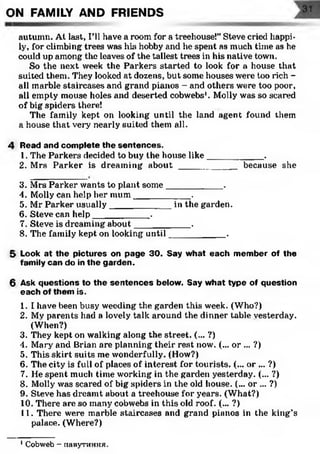
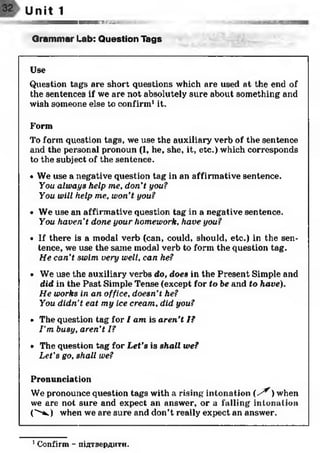
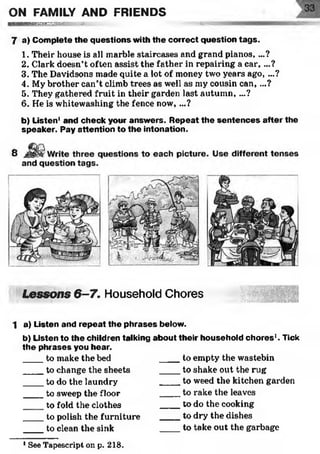
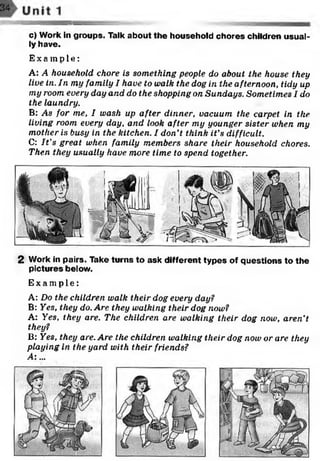
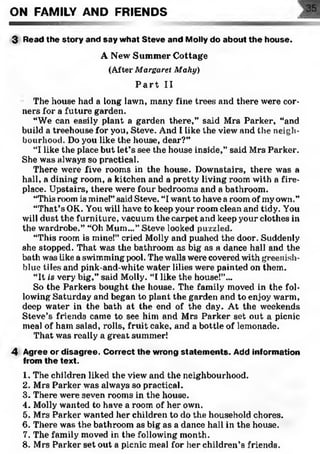
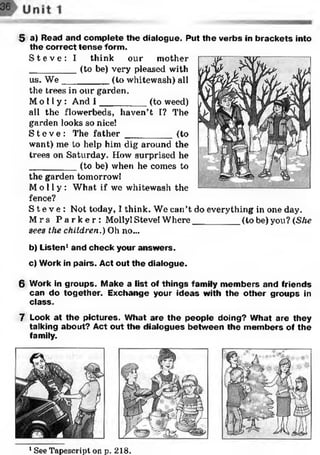
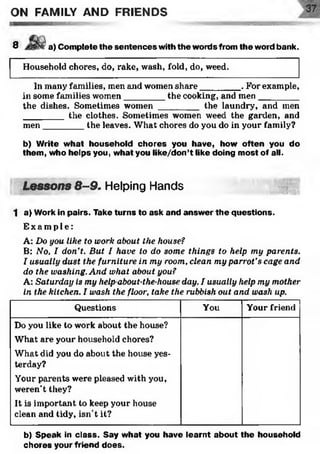
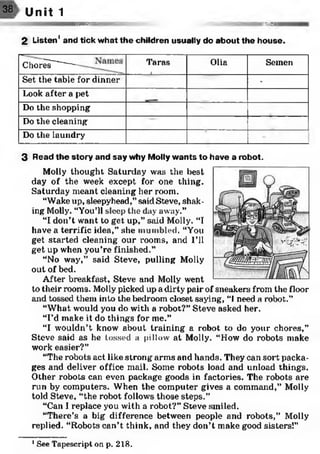
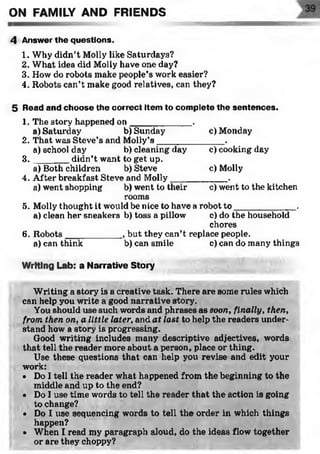
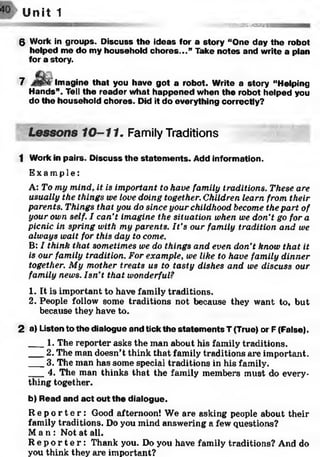
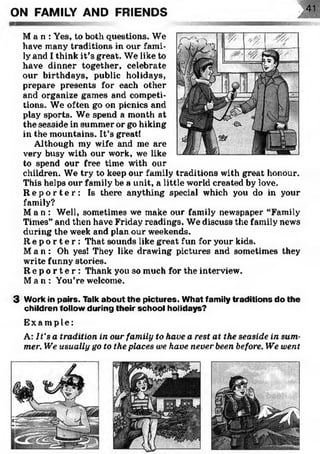
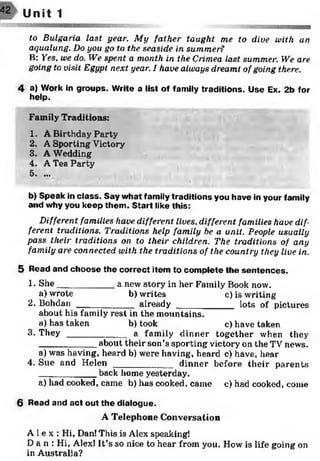
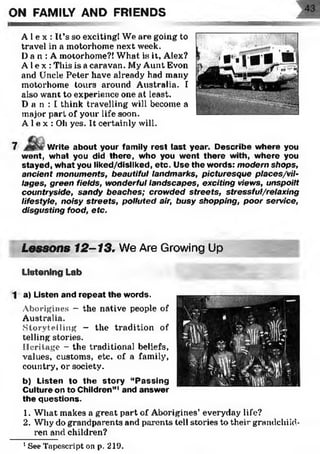
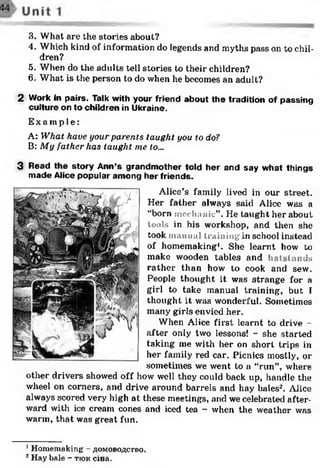
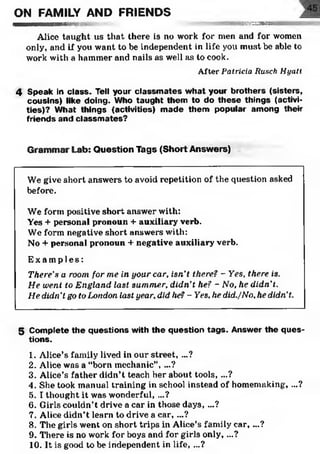
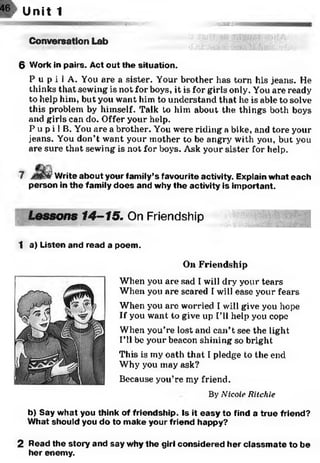
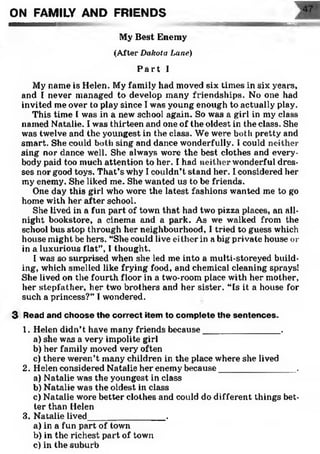
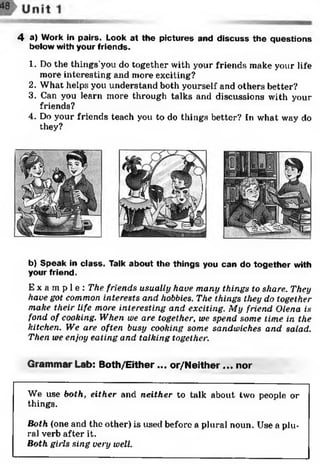
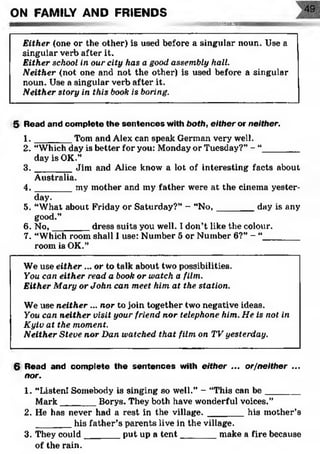
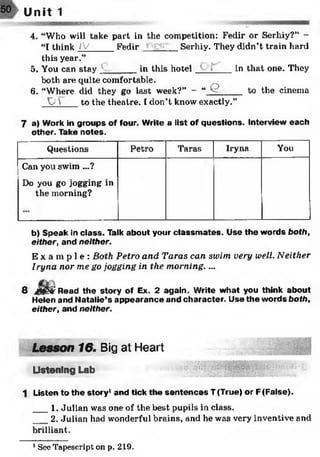
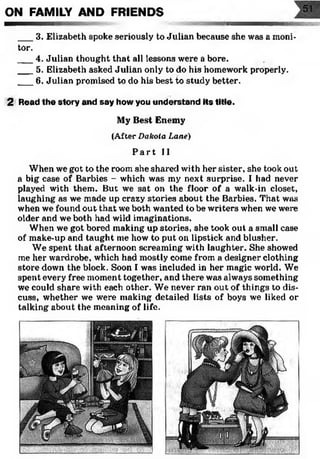
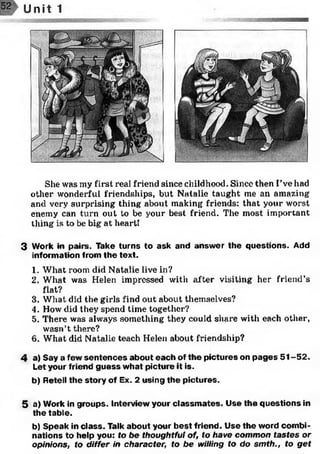
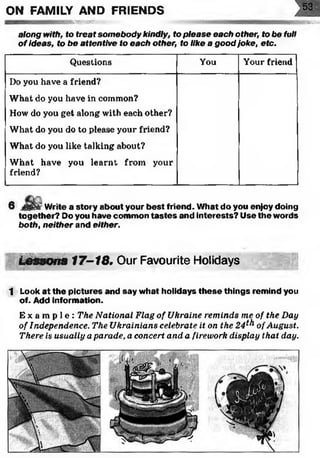
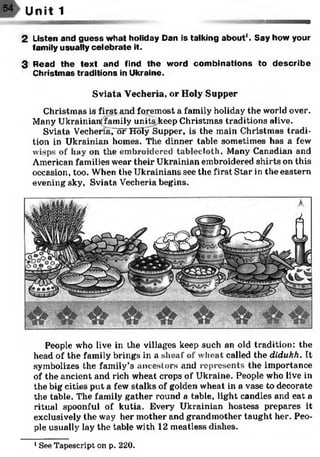
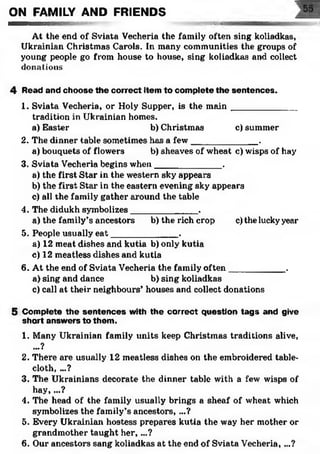
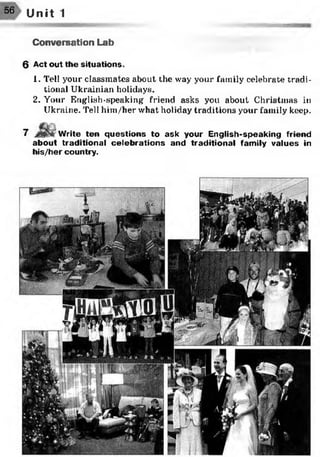
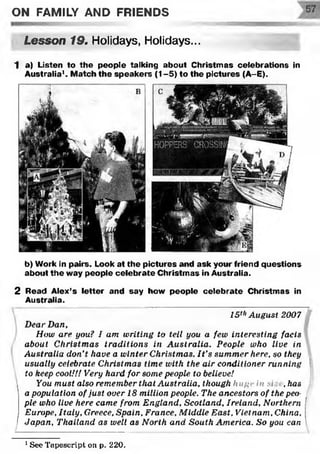
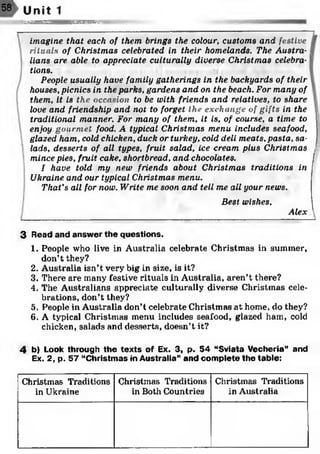
![ON FAMILY AND FRIENDS ] 59
■ ■ ■ ■ ■ ■ n m R M v ws№*. uc
5 Speak in class. Talk about the differences of celebrating Christmas
in Ukraine and Australia.
6 Write about the holiday you celebrate at home. What family
traditions do you have? Use the words and phrases: to feel interes
ted, to devote much time to, to be excited about, to have an enjoy
able time, to be a pleasure, to have a lot of things to do, to prepare
smth. for a party, to organize smth. properly, to find time for,
impressive, delightful, wonderful, splendid, amusing, etc.
Lesson 20, Grammar Revision
1 Complete the sentences with the correct question tags.
1. Steve hasn’t watered the lawn yet, ... ?
2. We can’t spend much time in your treehouse, ... ?
3. They were discussing the news at that time yesterday, ... ?
4. This souvenir reminded him of his visit to Australia, ... ?
5. My sister is wearing an embroidered blouse, ... ?
6. My mother won’t do the laundry tomorrow, ... ?
2 Read the text and put the missing sentences (A-F) in the correct
spaces (1-6).
Easter in Ukraine
Easter is the feast of the Christ’s Resurrection. (1)________
______. It is celebrated on Sunday between the 4thof April and the
8,h of May. The Ukrainians celebrate Easter over a long period of](https://image.slidesharecdn.com/72007-160621194318/85/7-_2007_-59-320.jpg)
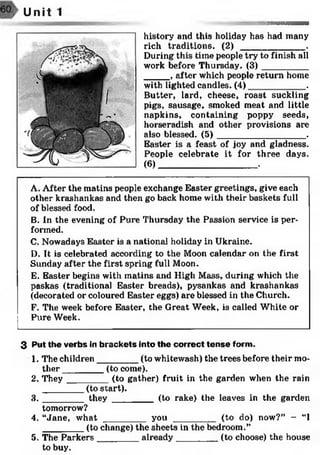
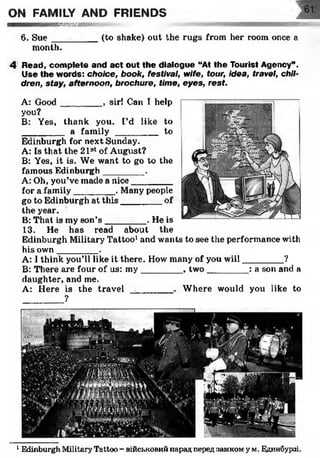
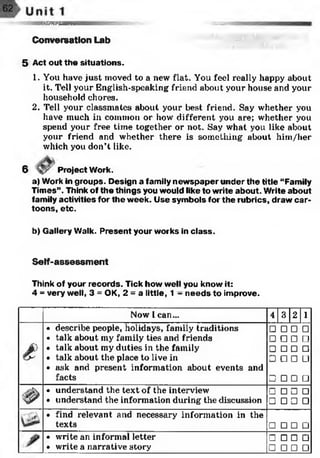
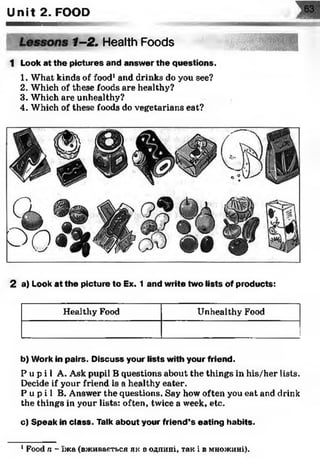
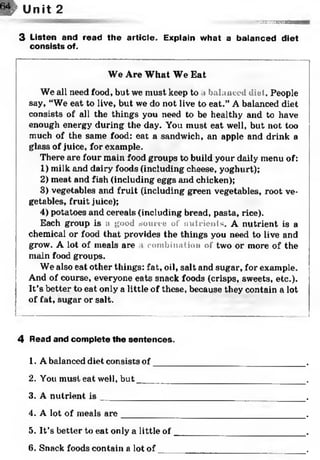
![FOOD
№m
Grammar Lab: Countable and Uncountable Nouns
Countable nouns [C], have singular and plural forms:
e.g. One sandwich - four sandwiches.
In the singular, countable nouns can follow definite (the) or
indefinite (a, an) articles. In the plural, they can follow the de
finite article or appear without an article.
Uncountable nouns [U], don’t have a plural form. They can
appear without an article and they cannot be used with an inde
finite article.
The following words are uncountable in English: milk, tea,
bread, sugar, flour, coffee, cheese, food, fruit, meat, pepper,
rice, salt, soup, water.
E x a m p l e :
I don't like milk.
They want some sugar with tea.
We say: sugar, some sugar, a lot of sugar, much sugar, a little
sugar (= not much sugar), little sugar (= almost no sugar).
5 Look through the text of Ex. 3 and find countable and uncountable
nouns. Make sentences with them.
6 Complete the sentences with a lot of, much, many, or Ilttle/a little.
1. Steve doesn’t usually eat________ sweets.
2. Have we got________ butter in the fridge?
3. There is ________ of meat in the freezer.
4. Is there________ mineral water in the bottle?
5. There is ________ sugar in my cup of tea.
6. I think we need________ flour to bake this cake.
7. There is ________ honey left in the jar. I need some more.
8. There are________ plants on the windowsill.
9. Peter has got________ English books in his home library.
10. Alan, do you drink much Cola? - No, Mum, only________ .
11. _______ people know this traditional recipe.
12.1 think, you need to a d d ________ more salt. The soup will
taste better then.](https://image.slidesharecdn.com/72007-160621194318/85/7-_2007_-65-320.jpg)
![7 Write questions to the sentences below. Start them with How
much ...?or How m any...?
1. Brian took two sandwiches to school yesterday.
2. Steve usually adds two spoons of sugar to one cup of tea.
3. Ann will buy one kilo of cheese tomorrow.
4. My mother drinks two cups of coffee every day.
Vocabulary: Study Note
Food [U] - things that people or animals eat or drink: She is
a lover of good food.
Food [C, U] - a specific type of food: health foods, a can of dog
food.
Hot/cold/spicy/fatty food
Fresh food - food such as vegetables and fruit.
Frozen foods
Canned/tinned food - food sold in cans.
Junk food - food that is full of sugar and fat and is bad for your
health.
Fast food - food such as hamburgers, chips that people usually
eat very quickly.
8 a) Work in pairs. Talk about your family eating habits. Use counta
ble and uncountable nouns in your dialogues and word combina
tions from “Study Note” given above. Discuss the questions.
1. Do you and your family argue about the food you eat?
2. Do you and your family argue about the food you don’t eat?
3. What are (aren’t) you allowed to eat?
4. What should you eat to have a balanced diet?
5. Do you often eat junk and fast food?
6. ...
b) Speak in class. Talk about your typical menu for the day. Let your
friends decide how healthy it is.
9 j^ j^ - Write about your eating habits. Do you keep to a balanced
diet? What do you need to change in your meals? Use the phrases:
fo be strong and healthy, to be active and lively, to keep fit, to look
good; to keep to a healthy diet, to keep to a diet of fruit and vegeta
bles, to eat a balanced meal, to eat at regular hours, to have good
eating habits; to eat a lot of sw eets, to eat fatty, spicy and salty
foods, to drink fizzy drinks.](https://image.slidesharecdn.com/72007-160621194318/85/7-_2007_-66-320.jpg)
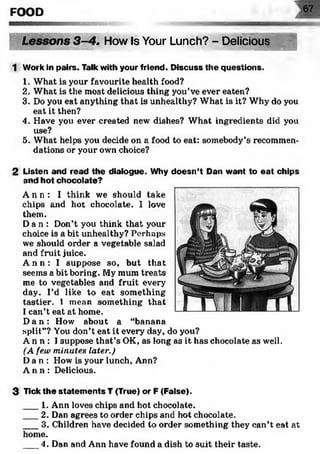
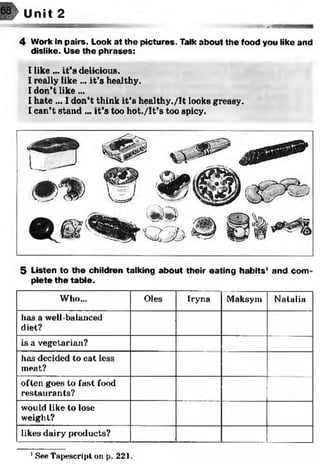
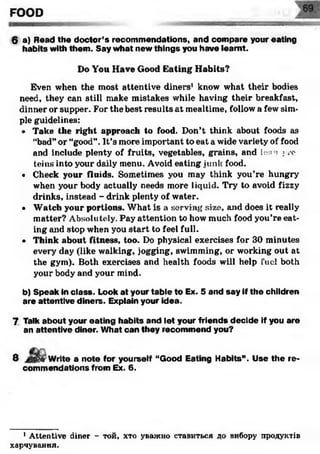
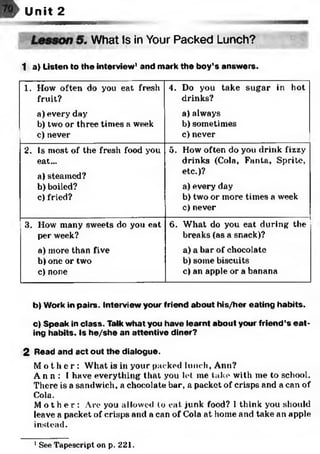
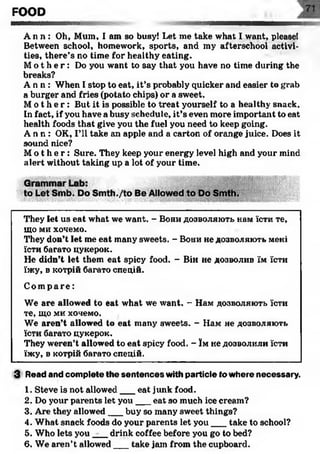
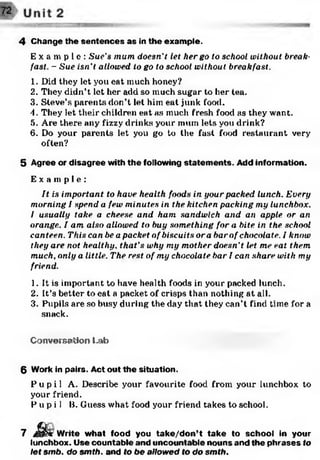
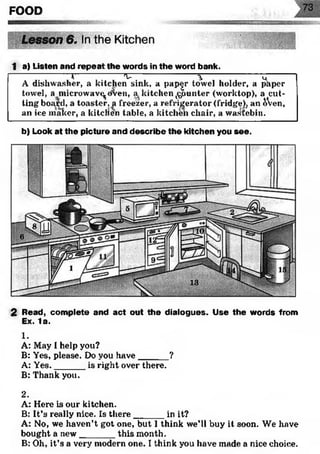
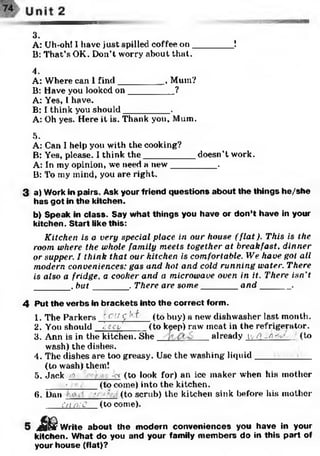
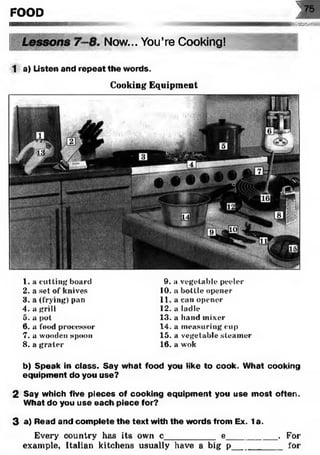
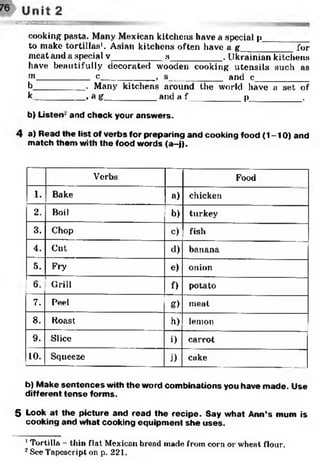
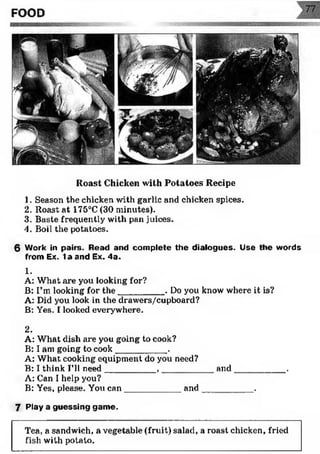
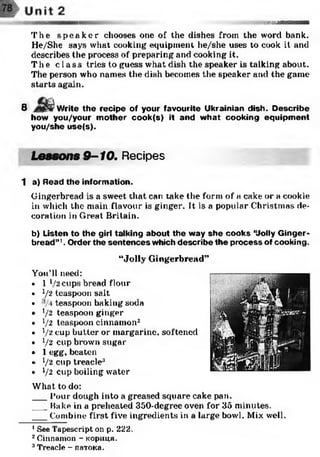
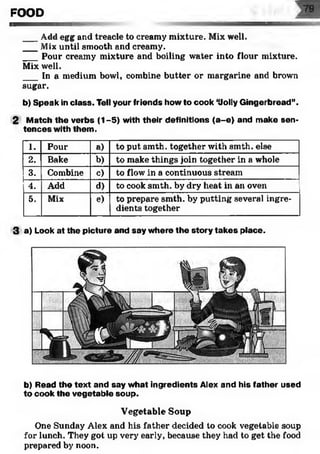
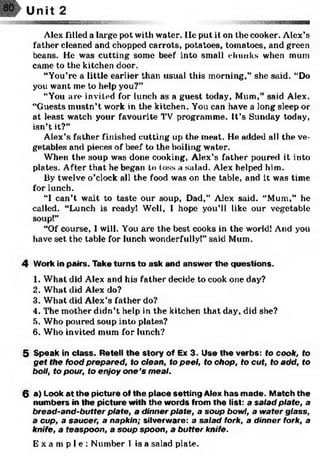
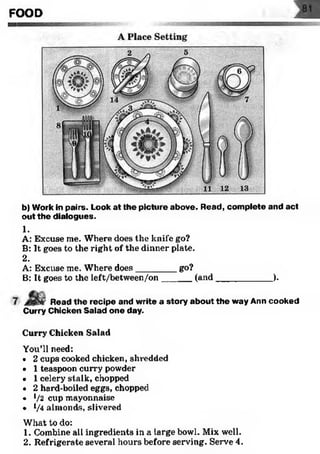
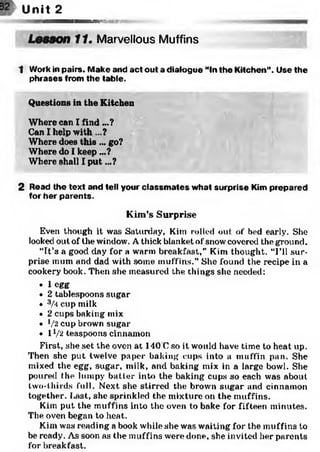
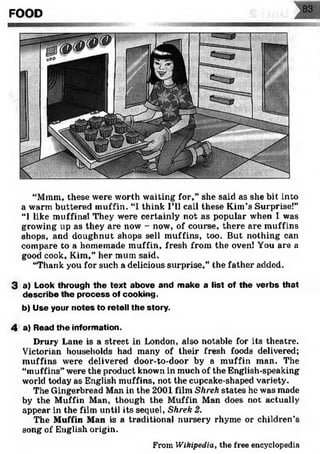
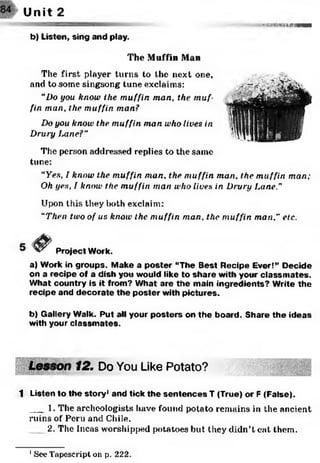
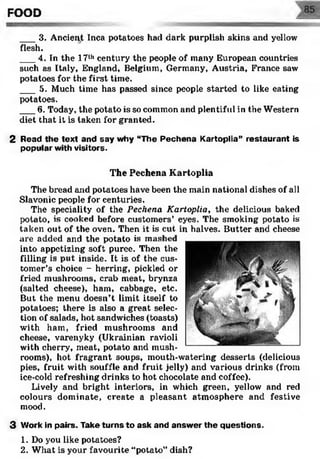
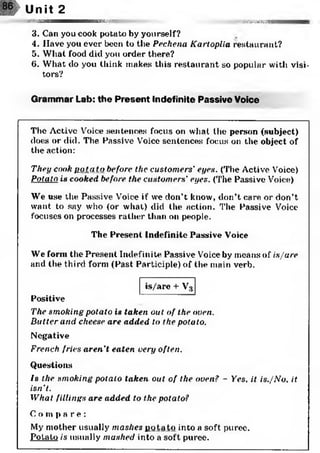
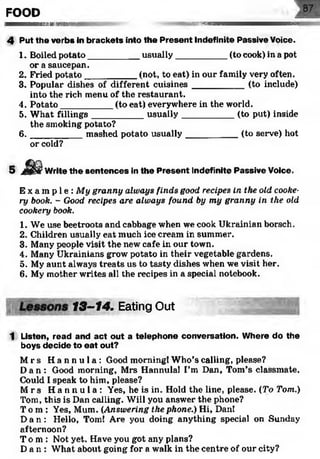
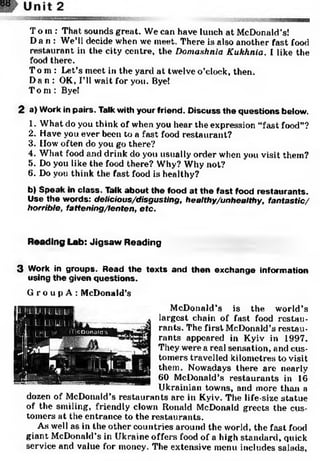
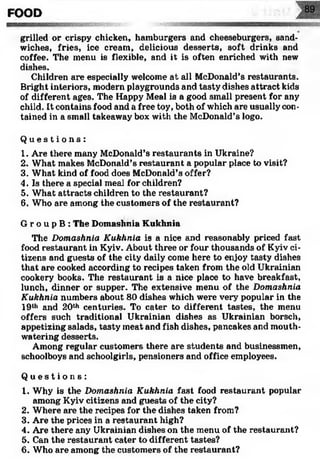
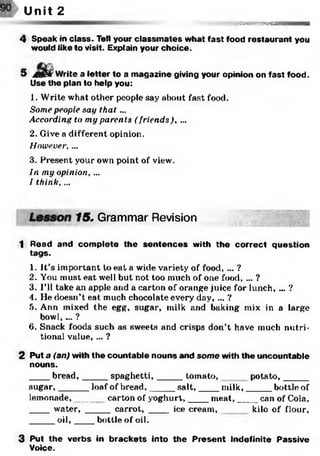
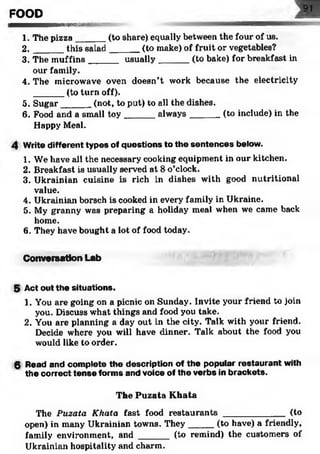
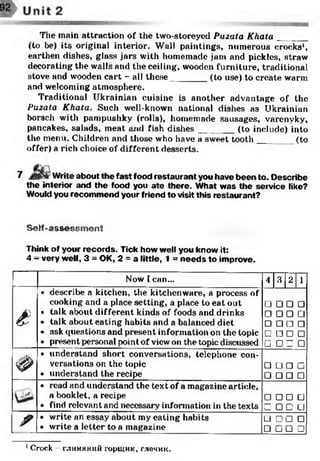
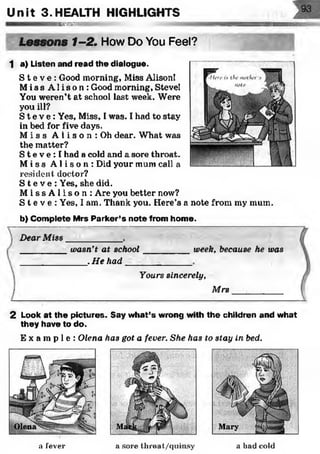
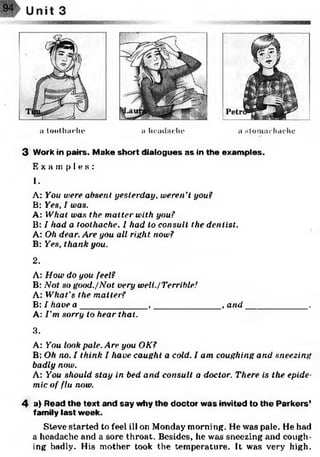
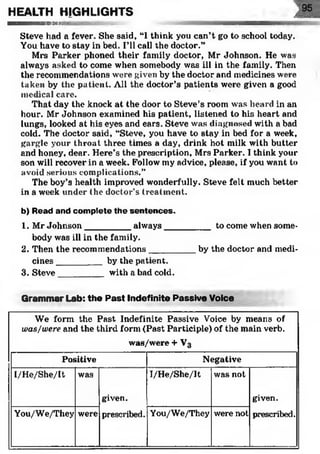
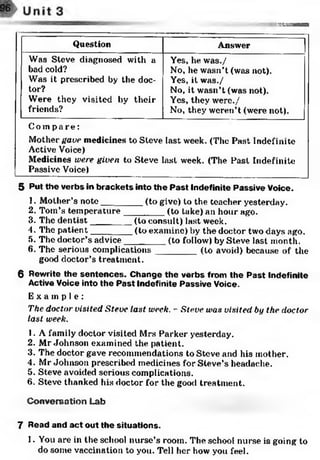
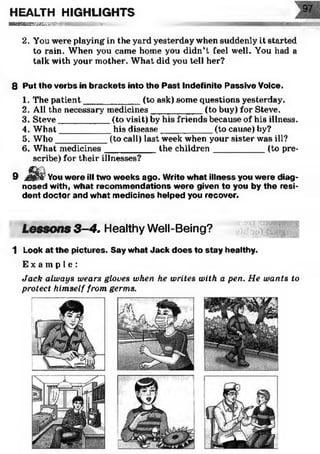
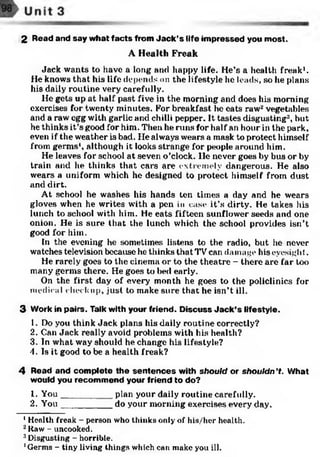
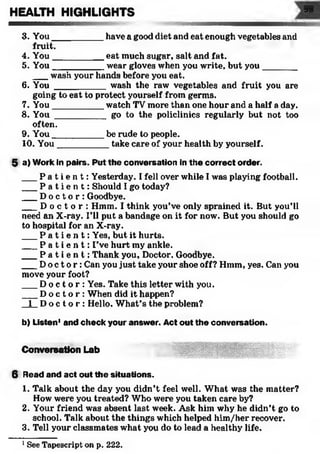
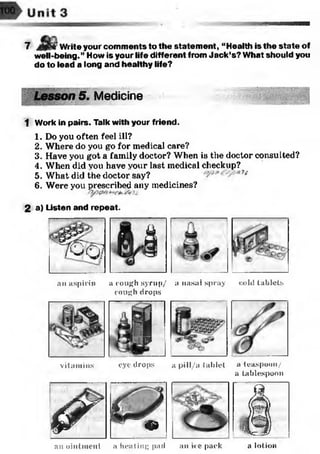
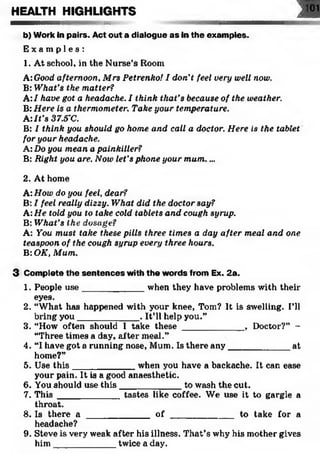
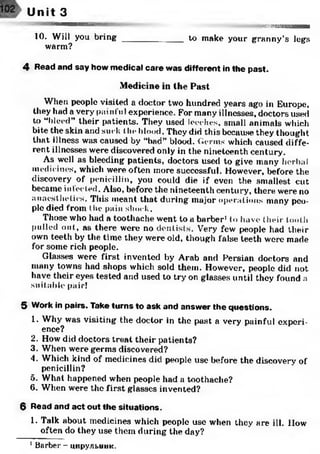
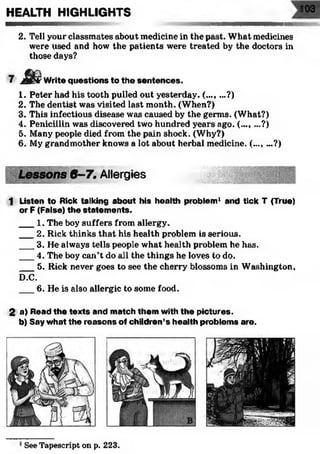
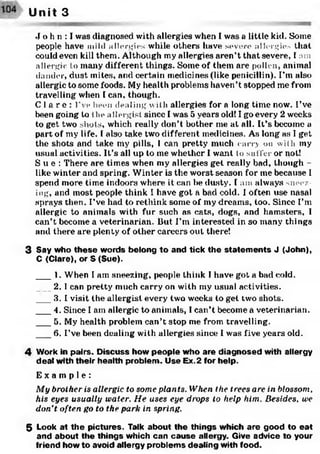
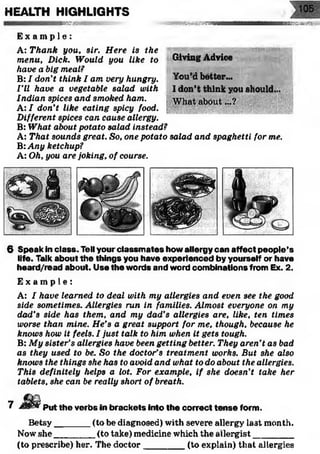
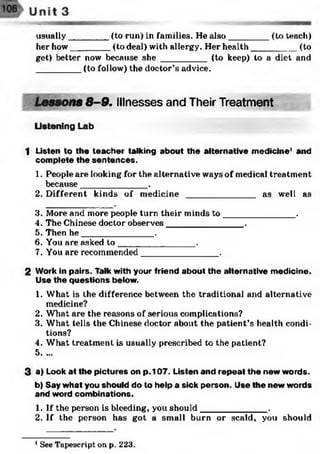
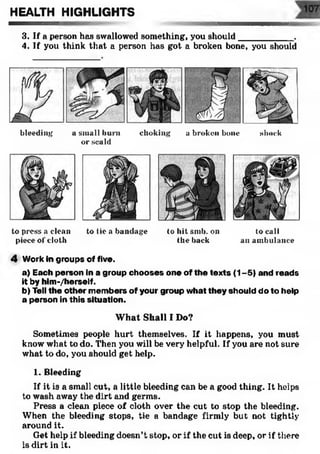
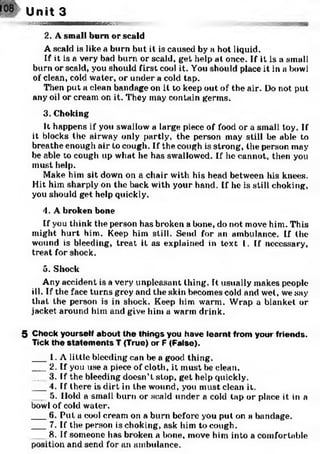
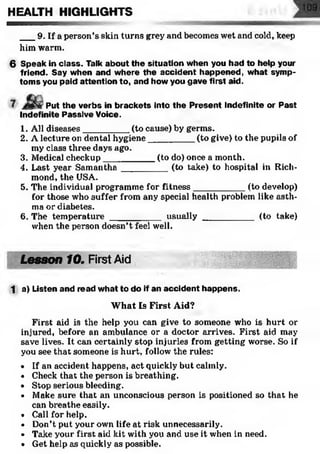
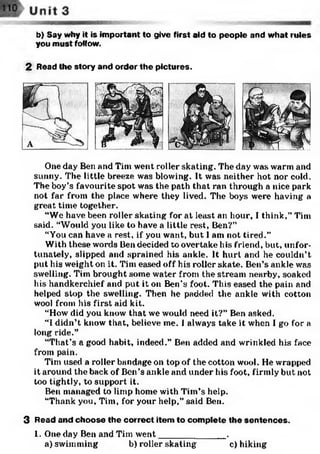
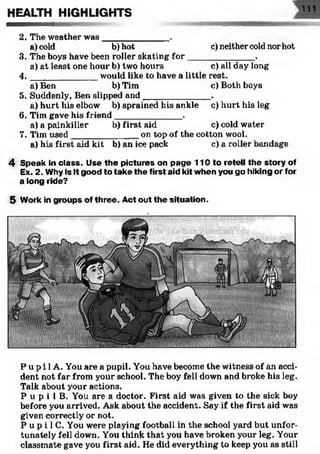
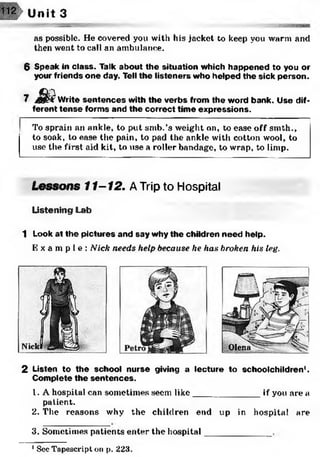
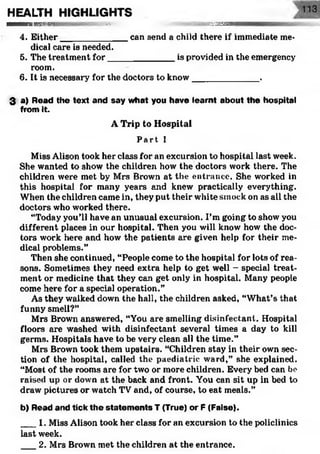
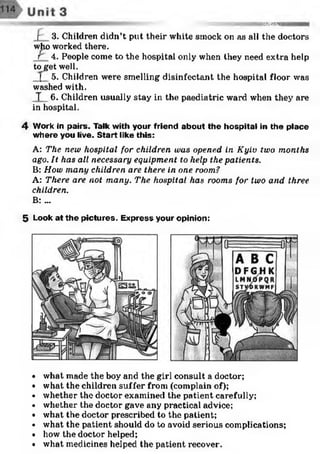
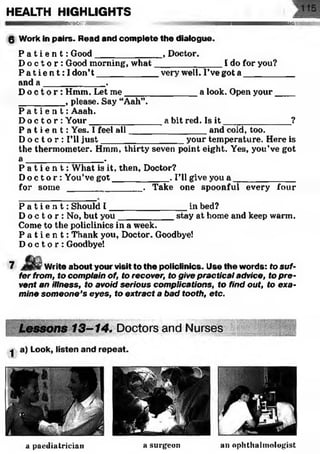
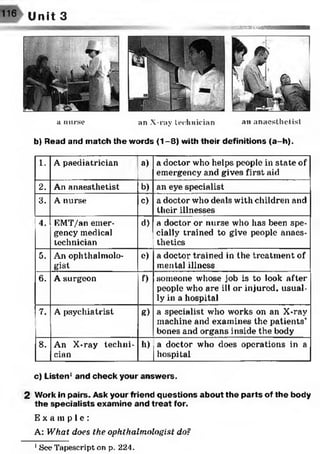
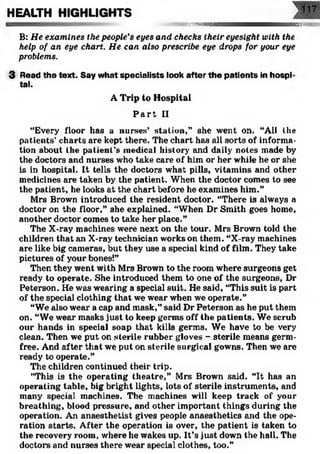
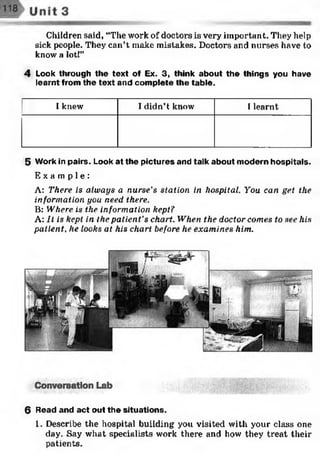
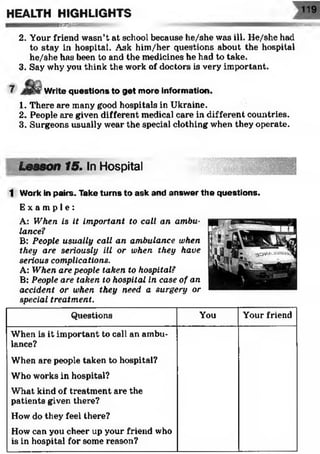
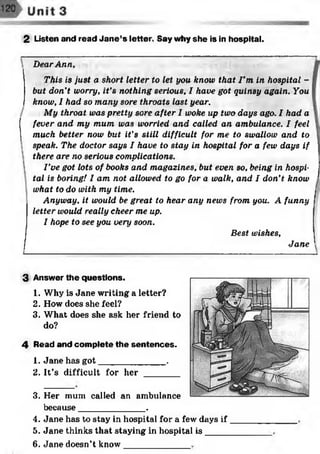
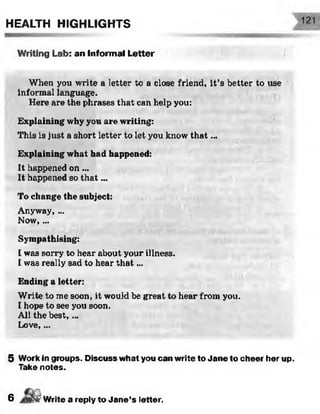
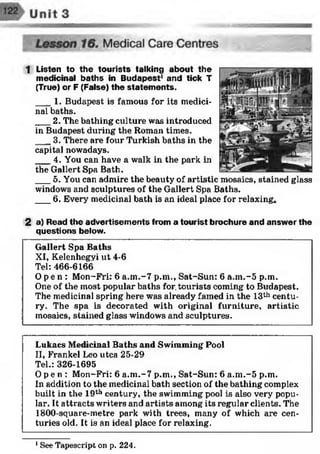
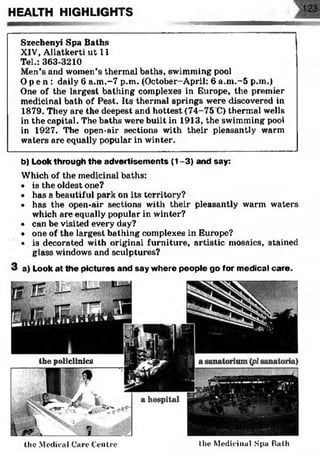
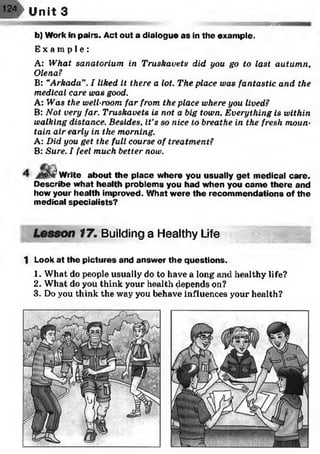
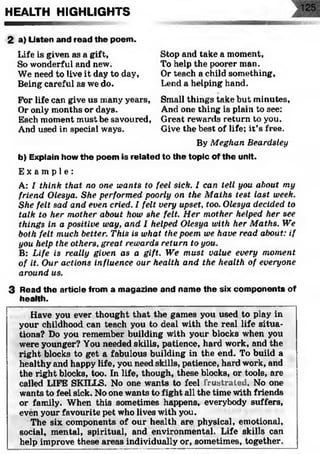
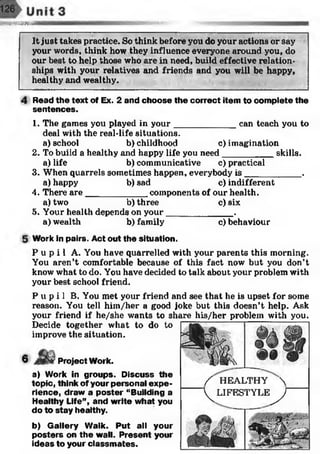
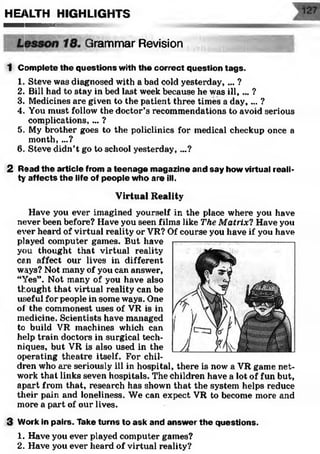
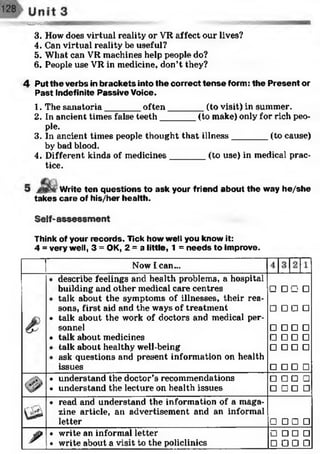
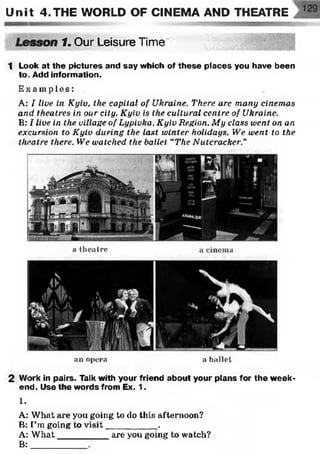
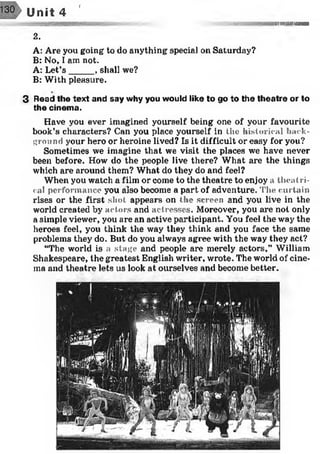
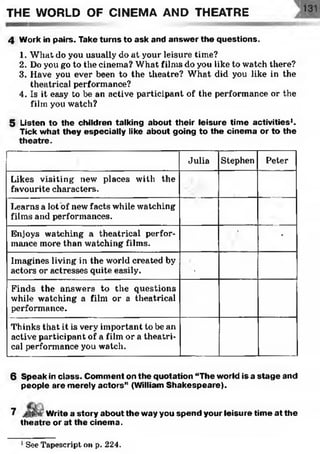
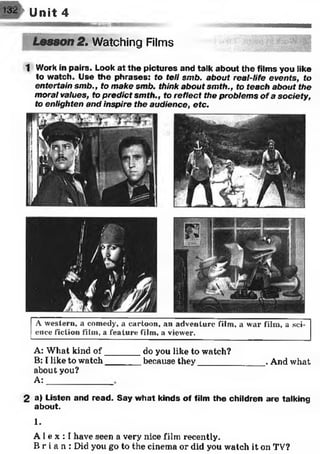
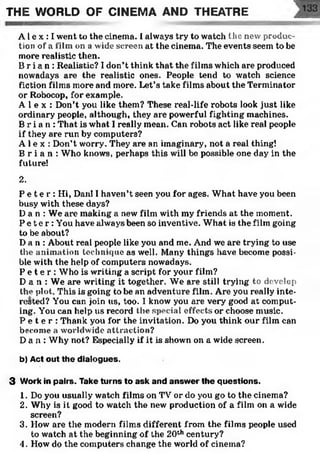
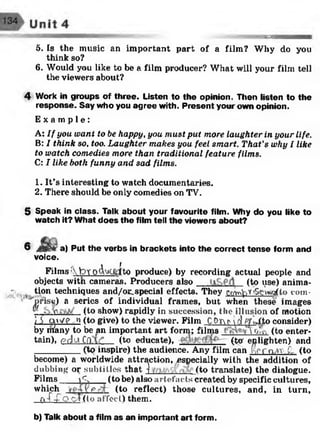
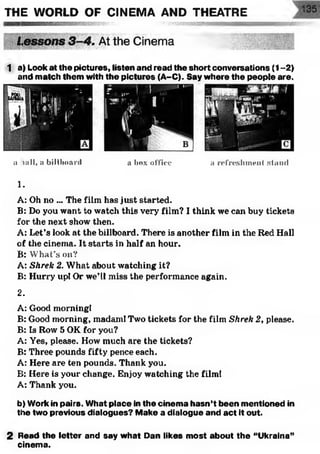
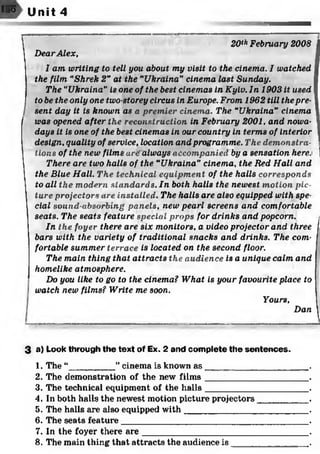
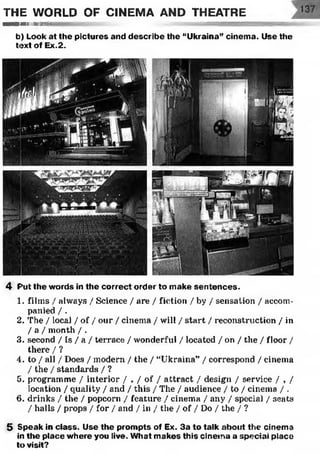
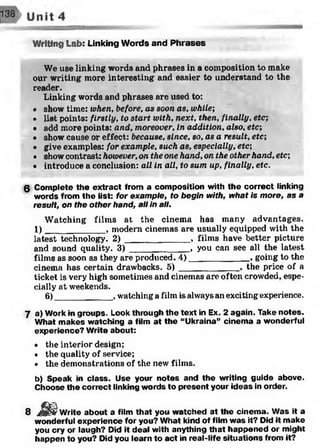
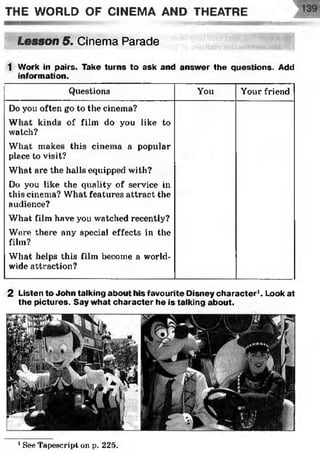
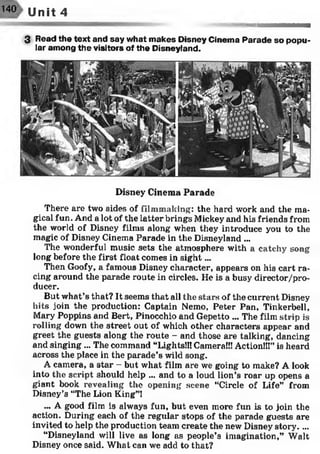
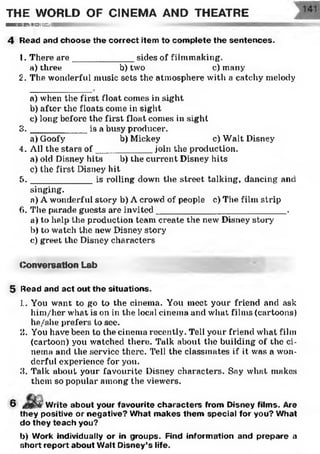
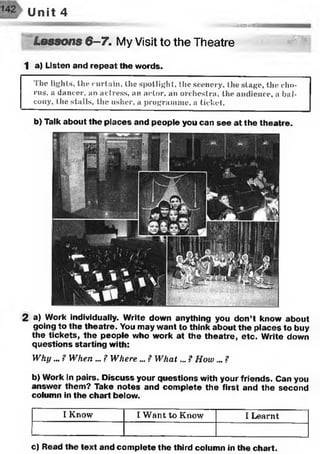
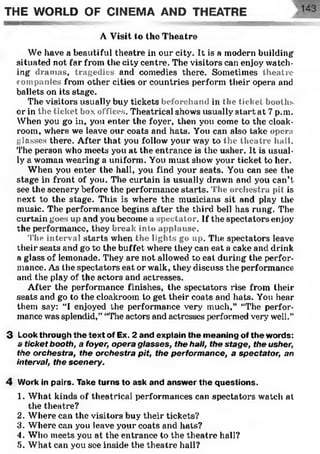
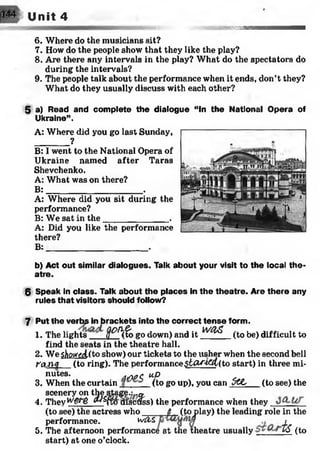
![THE WORLD OF CINEMA AND THEATRE
■ ■ ■ ■ ■ ■ № № № T ' T H i l l l l l M — i
6. The Parkers____ (to be) in the cloakroom. They __________
already______ (to leave) their coats and hats there. Now they
____ r_ (to take) the. opera glasses.
7. When the play_______] (to finish), the spectators_______ (to
break) into applause. They really_______ (to like) the play.
â.
8 w rite about the advantages/disadvantages of watching a
perform ance at the th eatre as to reading a book. What do you like
doing m ore? Use linking words and phrases in your story.
Lessons 8-9. Watching a Performance
Listening Lab
1 Listen to the conversation between Mr and Mrs Parker1. Tick the
statem ents T (True) or F (False).
___1. Mr and Mrs Parker are going to the theatre next Sunday.
___2. Mr Parker bought the tickets online.
___3. Their seats are in the stalls.
___ 4. Mrs Parker thinks they are going to have a wonderful
evening.
2 Read the text and say what makes the Kyiv Marionette Theatre a
good place to visit.
The Marionette Theatre
The Kyiv Marionette Theatre was founded by the producer and
artist Mikhailo Yaremchuk in 1989. Since then this rather small
theatre with the auditorium seating 100 people has been a destina
tion for a lot of children. The theatrical performances which are
shown there bring its visitors to an imaginary world of talking
puppets and fairy tales.
The majority of the performances are aimed at family audience
and children of 6 and more, but there are also plays good for chil
dren at the age of 4 as well. The Marionette Theatre is an ideal way
of introducing children to the great fairy tales of Ukrainian and
1See Tapescripton p. 225.](https://image.slidesharecdn.com/72007-160621194318/85/7-_2007_-145-320.jpg)
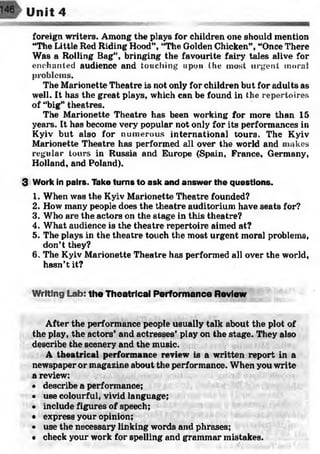
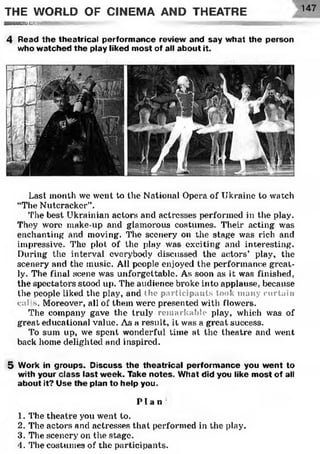
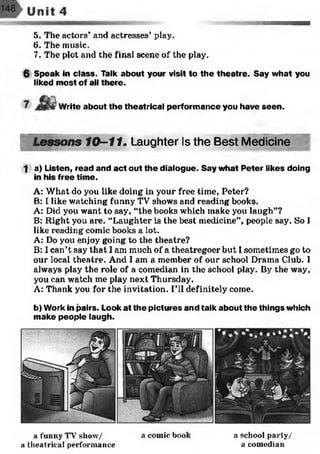
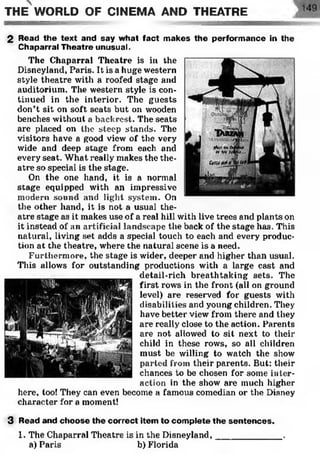
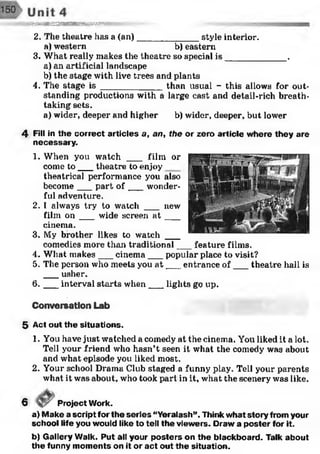
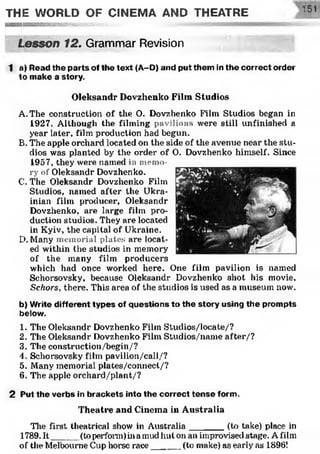
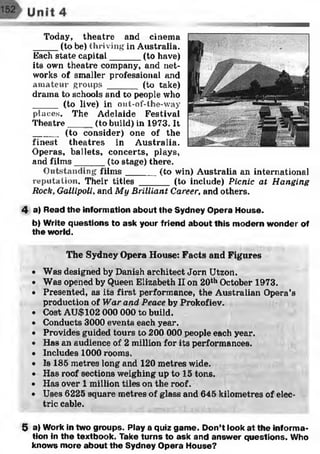
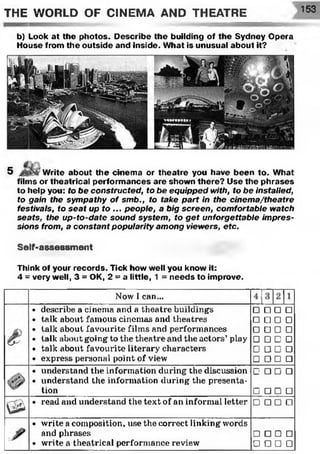
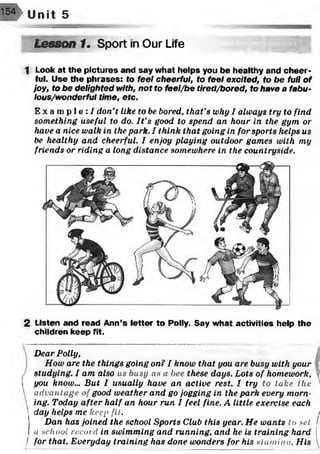
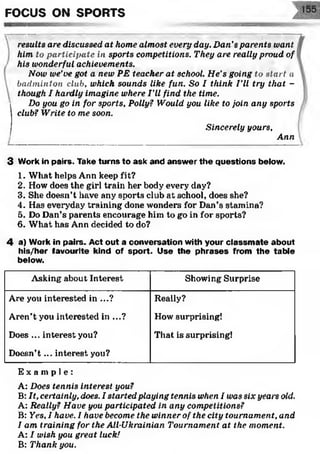
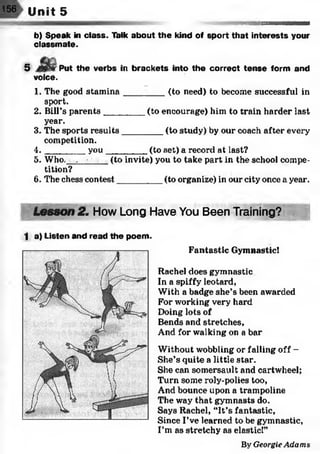
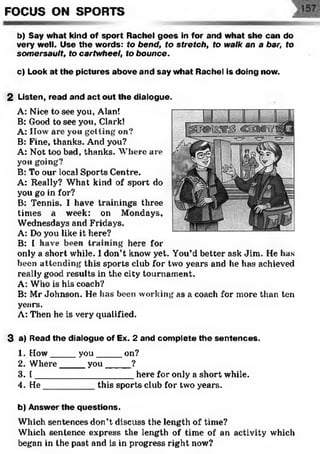
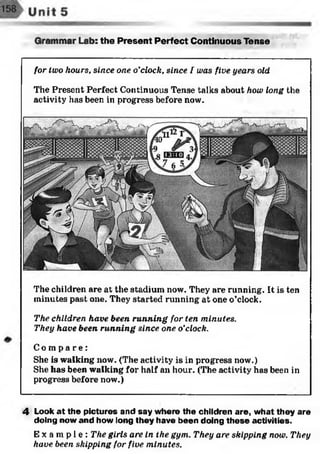
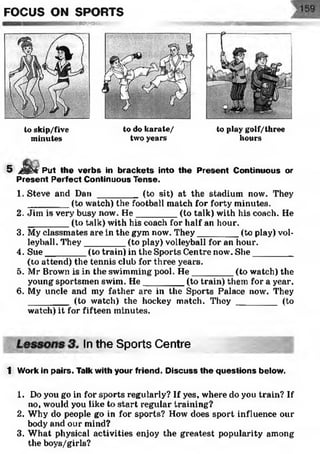
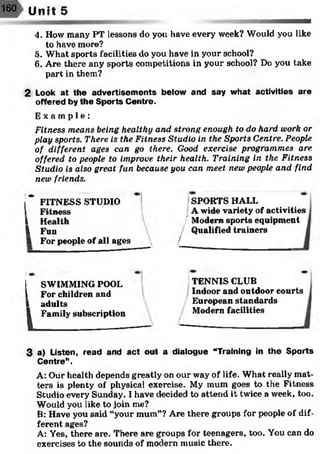
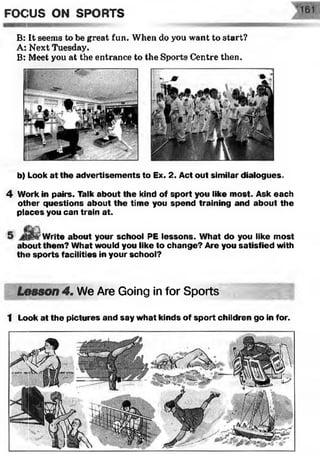
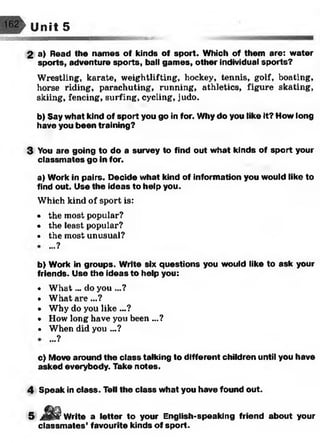
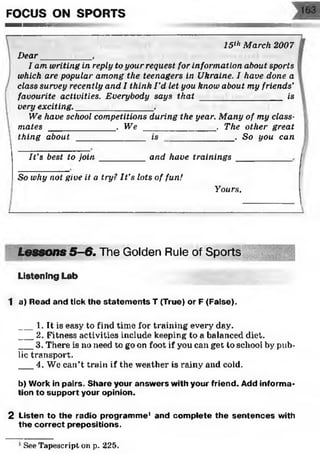
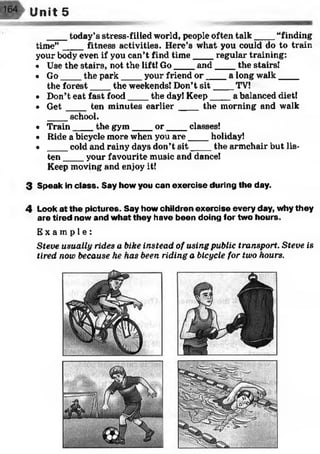
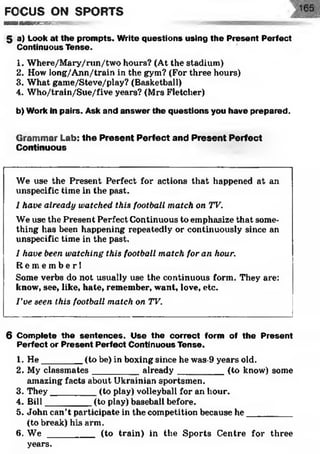
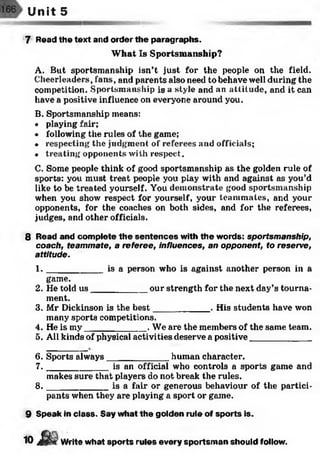
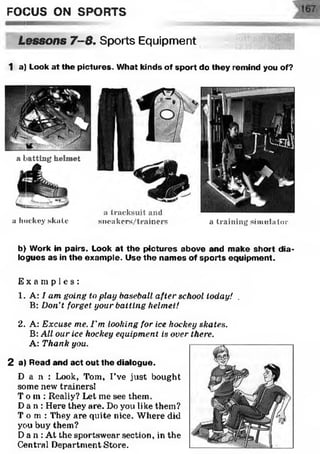
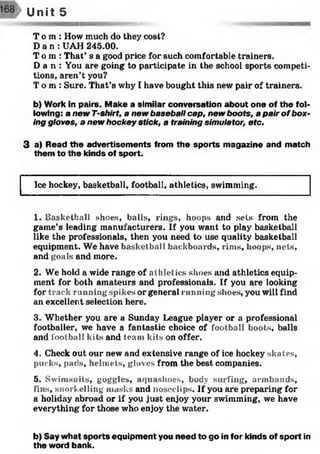
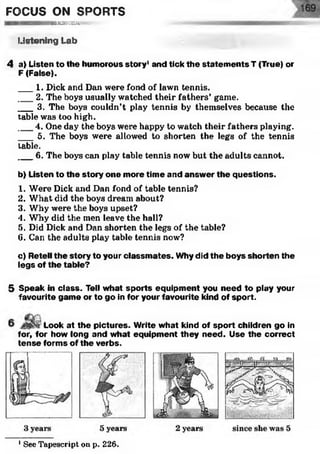
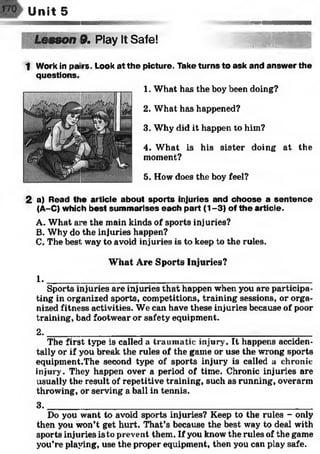
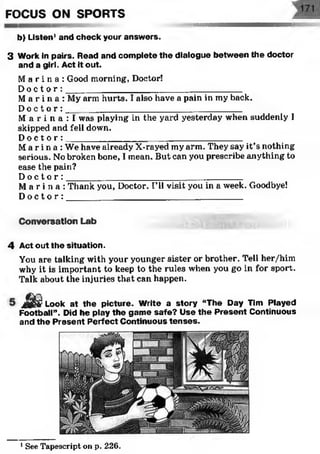
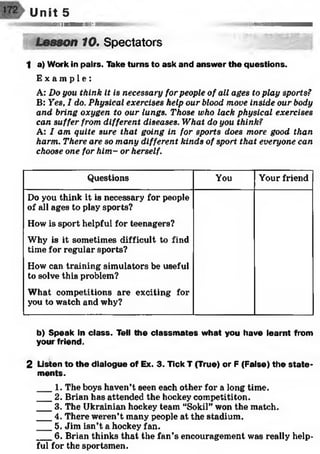
![FOCUS ON SPORTS
3 Work in pairs. Read the dialogue and make a similar one. Talk about
the sporting event you attended.
B r i a n : Hi, Jim! I haven’t seen you for ages!
J i m : Nice to see you, Brian! It’s been a long time since we met.
B r i a n : You are so excited! Where have you been these days?
J i m :I have attended the hockey competition at the Palace of Sports
this week. My favourite Ukrainian hockey team “Sokil” met
“Spartak” (Moscow). Ukrainians won a victory with the score 2:1.
Aleksyuk scored the last goal. He showed his best play in the game.
B r i a n : Congratulations! I can imagine how wonderful the sight
was! Did you cheer your favourite players up?
J i m : Oh yes. It was impossible to sit still during the game. There
was a crowd of spectators round the sports field. They followed the
game with the great interest and shouted to their favourite
players.
B r i a n : I hope that the fan’s encouragement was really helpful
for the sportsmen.
J i m : It certainly was.
Writing Lab: a Report about a Sporting Event
When you write about the sporting event you have to mention:
• the countries-participants;
• where and when the competition (the game) was held;
• the results;
• the best players (sportsmen);
• any exciting (amusing, thrilling) moment;
• your classmates’ impressions.
Write your conclusion about the contest as a social event.
4 a) Work in pairs. Look through the dialogue of Ex. 3 and find the
facts you need to mention while writing a report about this hockey
competition.
b]i Speak in class. Make a report about the hockey competition Jim
has attended.
5 Look at the pictures. Talk about the sporting events on them.
Describe the spectators’ feelings. Use the words to help you: the
excitement of the competition, to admire, to show particular inte
rest in, to applaud, to be enthusiastic, etc.](https://image.slidesharecdn.com/72007-160621194318/85/7-_2007_-173-320.jpg)
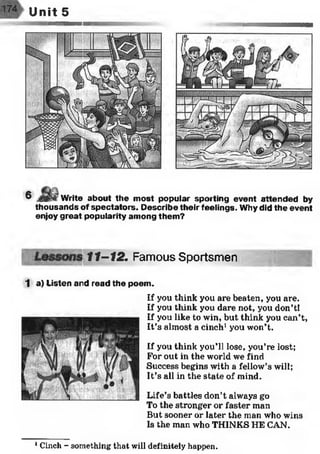
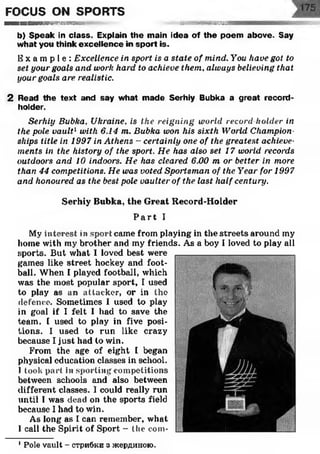
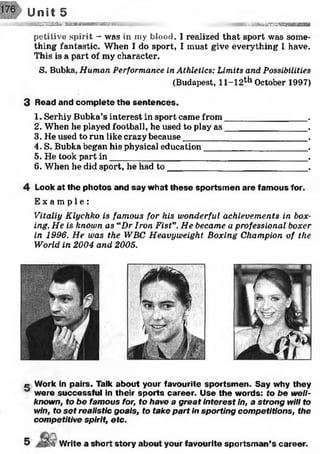
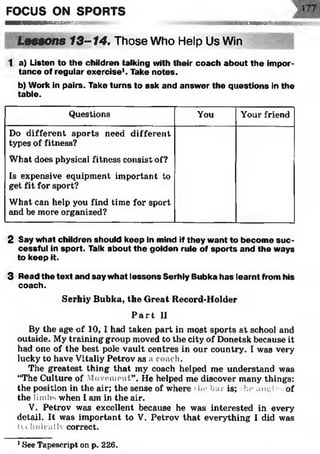
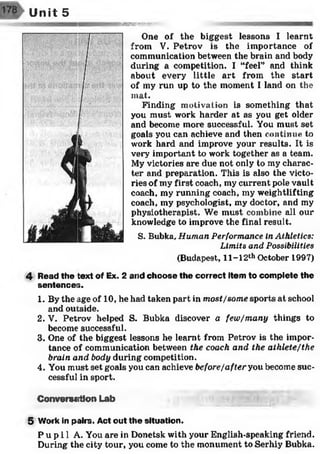
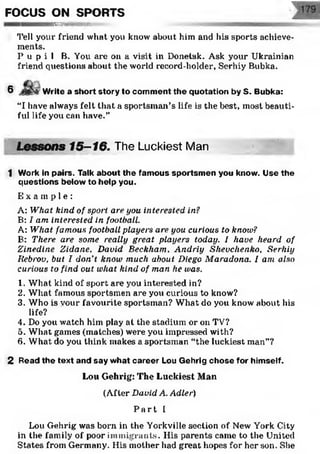
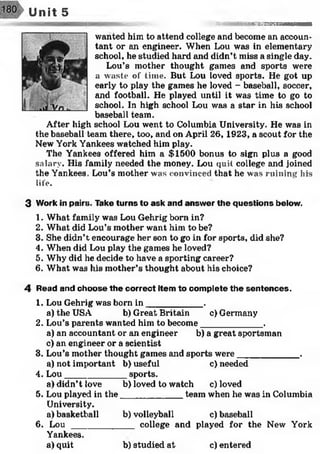
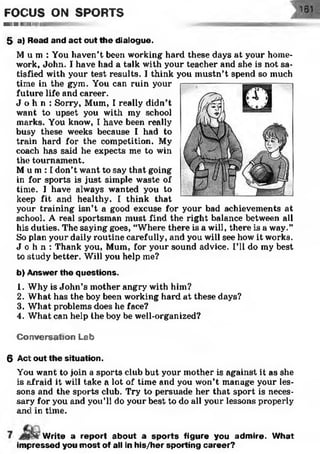
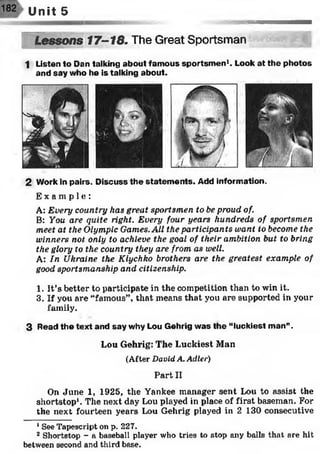
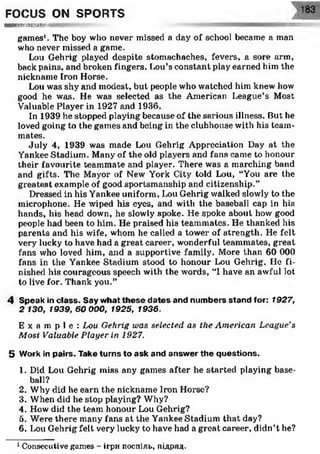
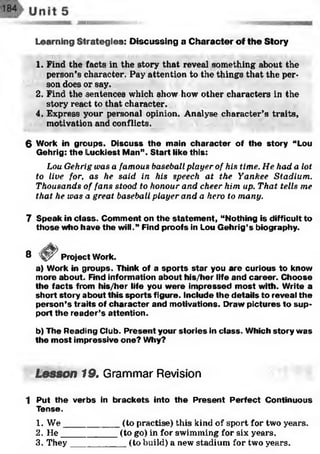
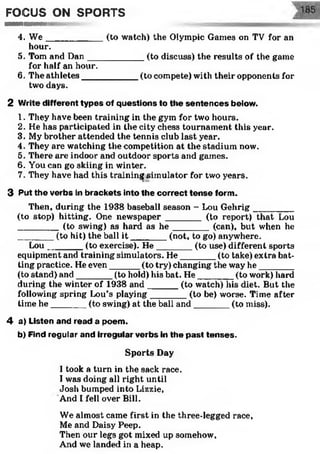
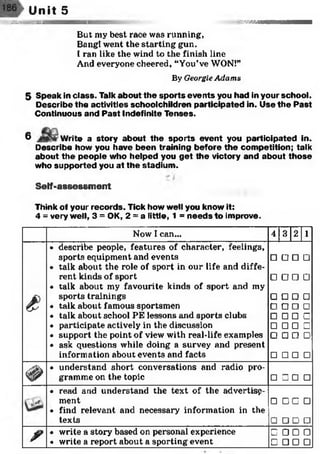
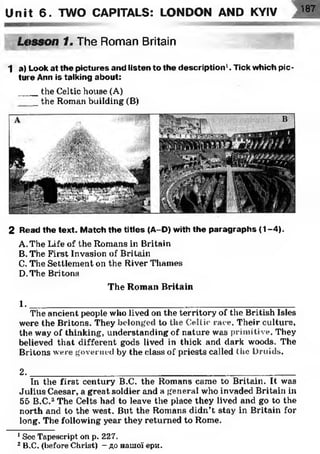
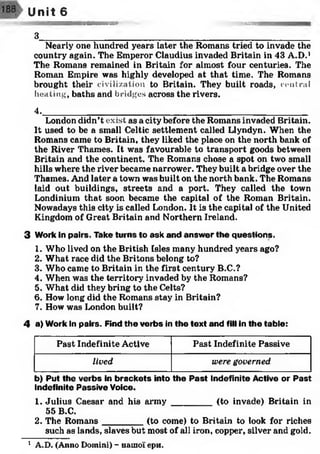
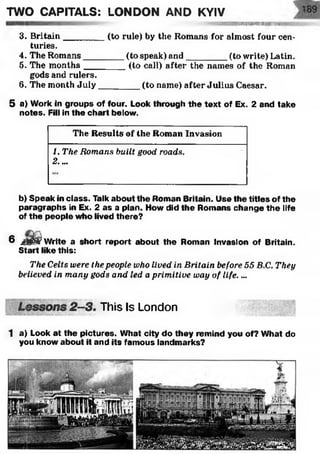
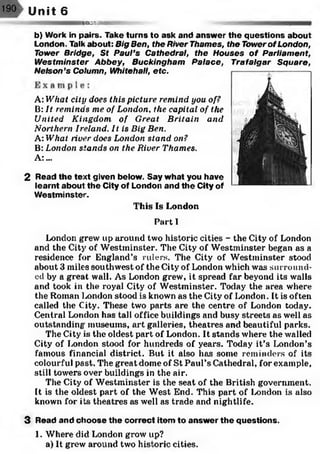
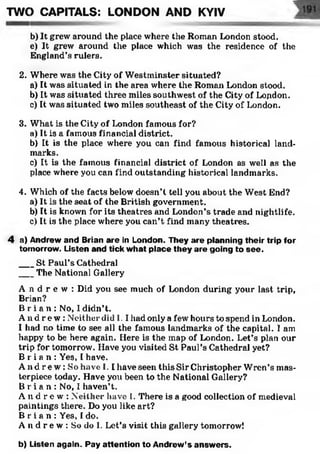
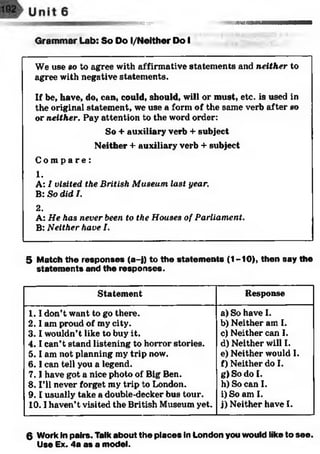
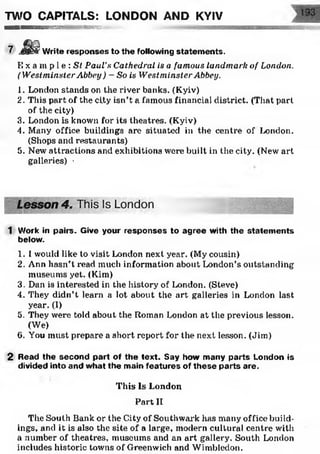
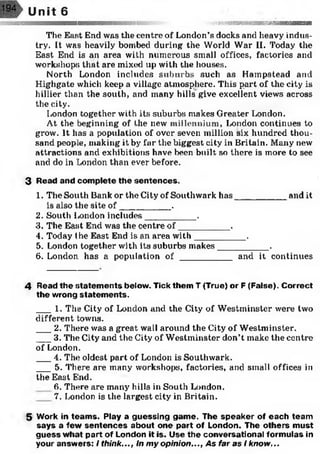
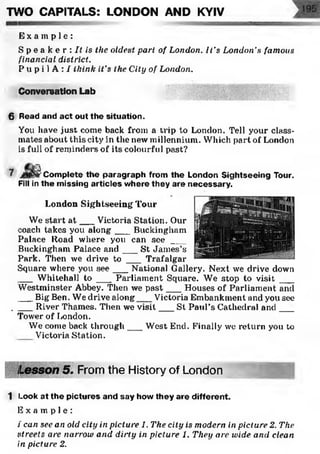
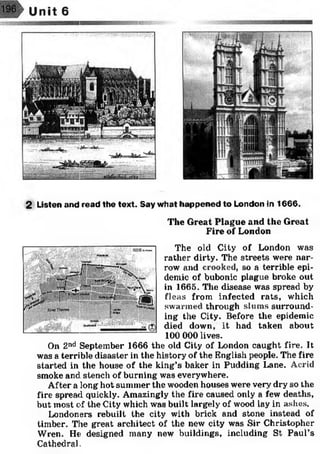
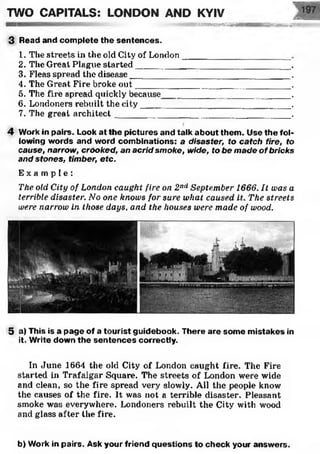
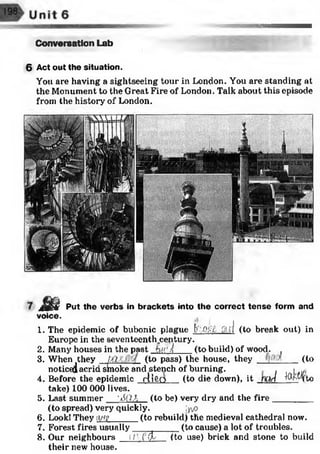
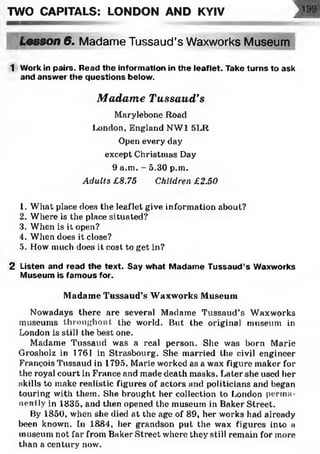
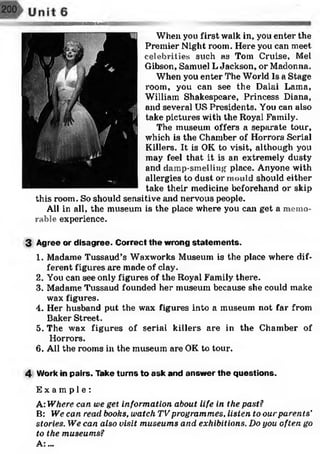
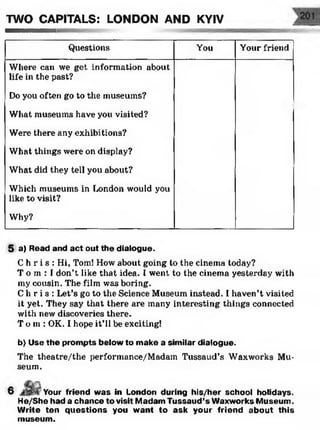
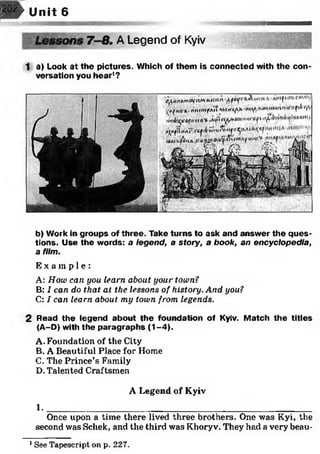
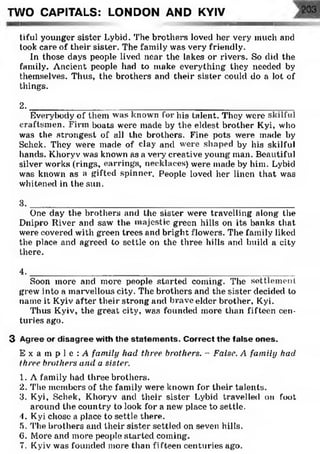
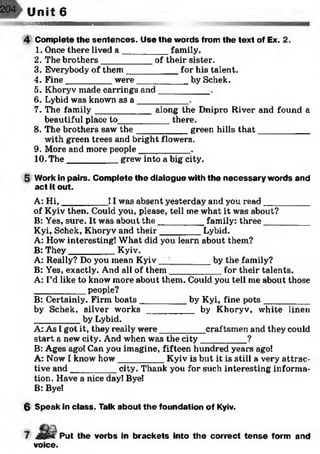
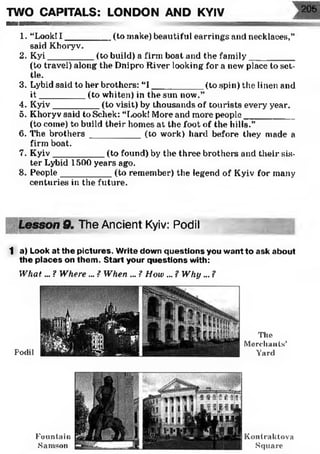
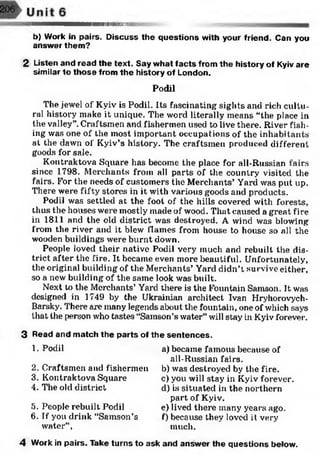
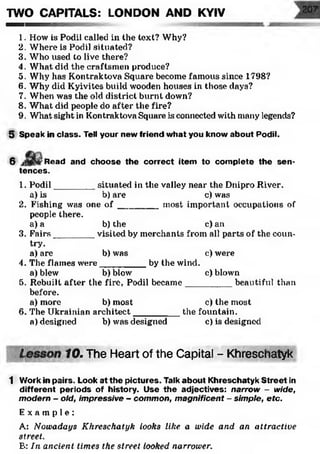
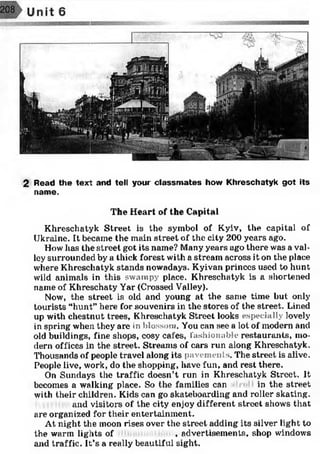
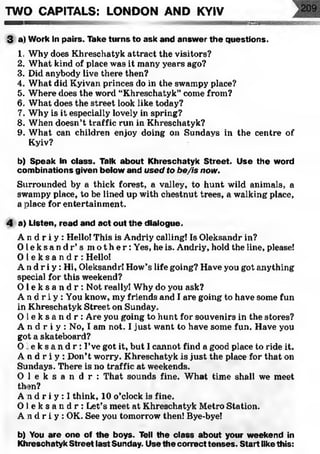
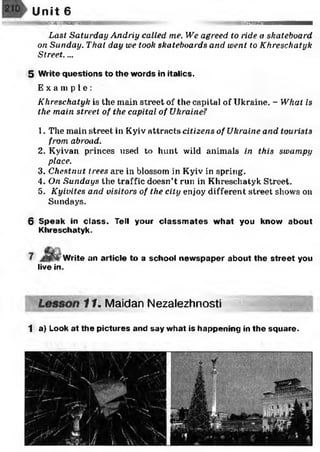
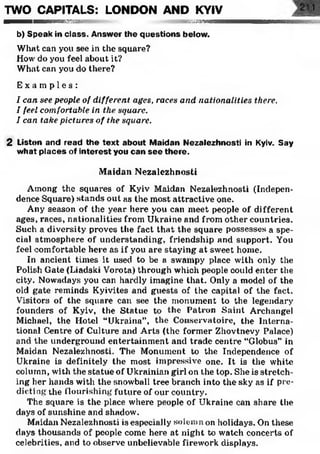
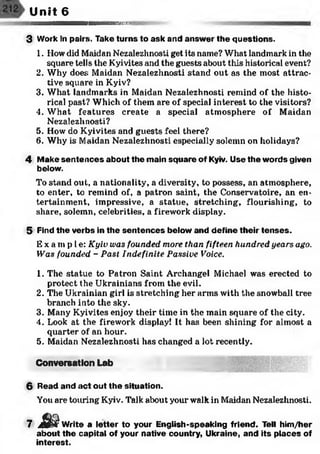
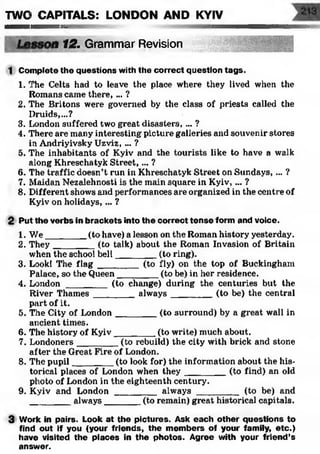
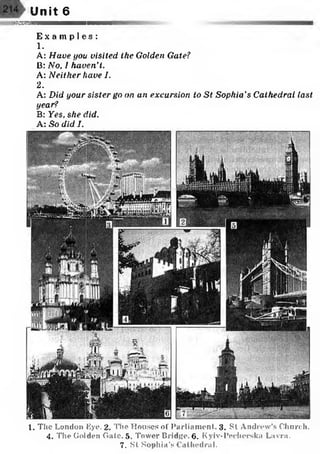
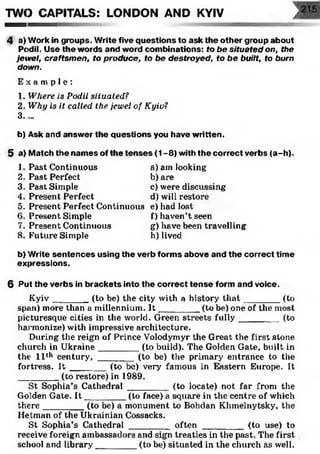
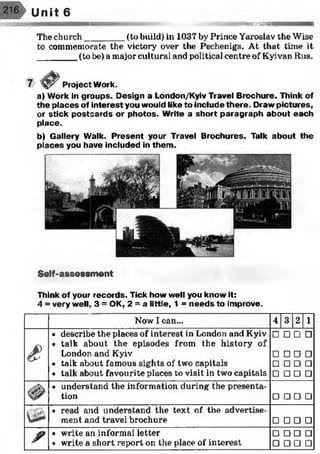
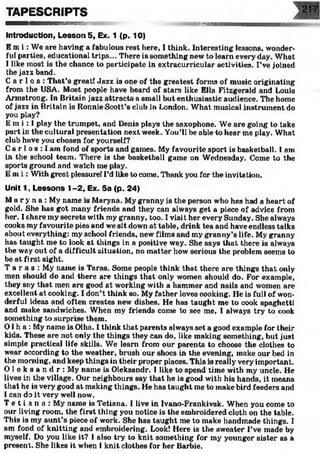
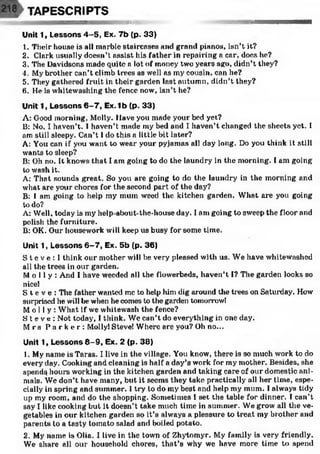
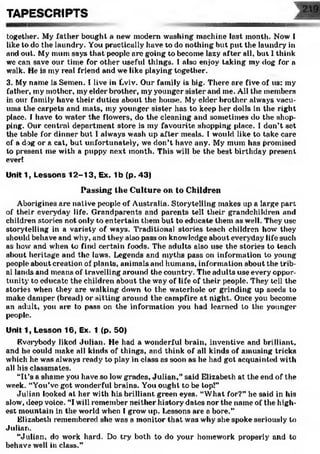
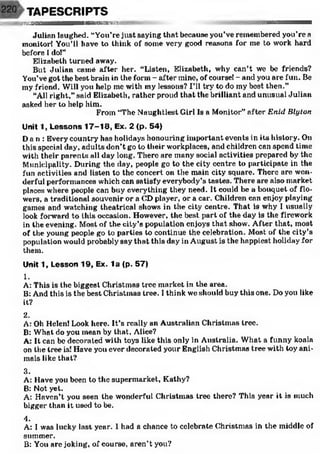
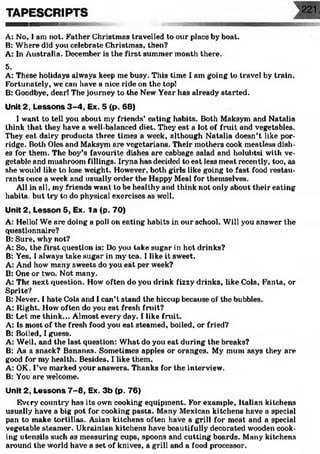
![“Jolly Gingerbread”
You’ll need:
• l ]/2 cups bread flour
• V2 teaspoon salt
• 3/4 teaspoon baking soda
• V'2teaspoon ginger
• i/2 teaspoon cinnamon
• t/2 cup butter or margarine, softened
• V'2cup brown sugar
• 1 egg, beaten
• V'2cup treacle
• V'2 cup boiling water
What to do:
1. Combine first five ingredients in a large bowl. Mix well.
2. In a medium bowl, combine butter or margarine and brown sugar.
3. Mix until smooth and creamy.
4. Add egg and treacle to creamy mixture. Mix well.
n. Pour creamy mixture and boiling water into flour mixture. Mix well.
6. Pour dough into a greased square cake pan.
7. Bake in a preheated 350-degree oven for 35 minutes.
Unit 2, Lesson 12, Ex. 1 (p. 84)
The History of Potato
In the ancient ruins of Peru and Chile, archaeologists have found potato
remains that date back to 500 B.C. The Incas grew and ate them and also wor
shipped them. Theyeven buried potatoes with theirriead, they dried them, and car
ried them on long journeys to eat on the way (dried or soaked in stew). Ancient Inca
potatoes had dark purplish skins and yellow flesh. The Incas called the potato
“papa”.
In the lG1*1 century the people of many European countries such as Italy,
England, Belgium, Germany, Austria, France saw potatoes for the first time.
Wherever the potato was introduced, it was considered weird, poisonous, and
downright evil. Much time has passed since people started to like eating potatoes.
Today, the potato is so common and plentiful in the Western diet that it is
taken for granted. We seem to forget that the potato has only been with us fora
few hundred years.
Unit 3, Lessons 3 -4 , Ex. 5b (p. 99)
D o c t o r : Hello. What’s the problem?
P a t i e n t : I’ve hurt my ankle.
D o c t o r : When did it happen?
P a t i e n t : Yesterday. I fell over while I was playing football.
Do c t o r : Can you just take your shoe off? Hmin, yes. Can you move your foot?
P a t i e n t : Yes, hut it hurts.
Unit 2, Lessons 9 -1 0 , Ex. 1b (p. 78)](https://image.slidesharecdn.com/72007-160621194318/85/7-_2007_-222-320.jpg)
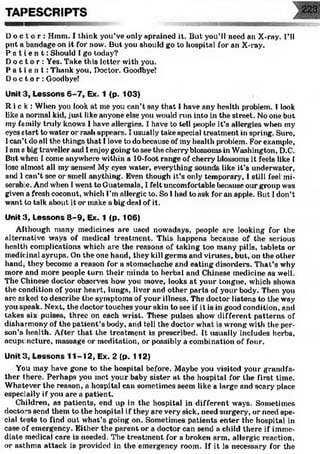
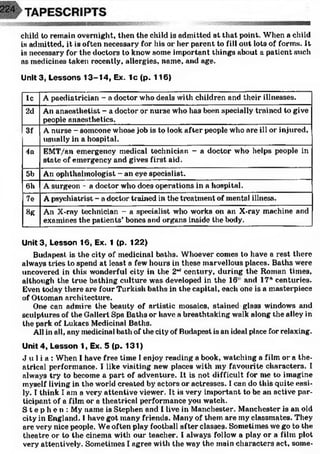
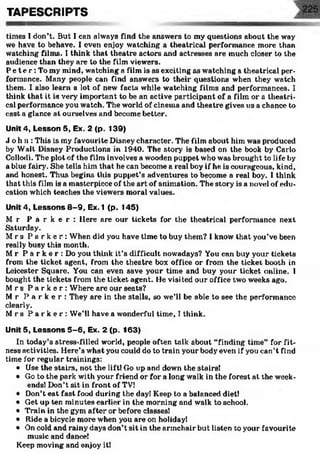
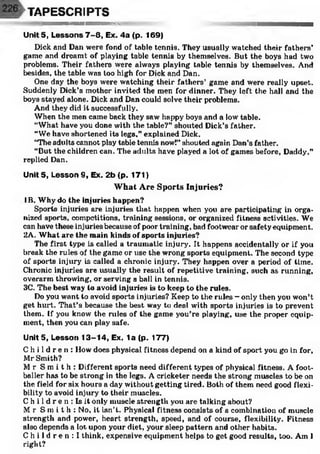
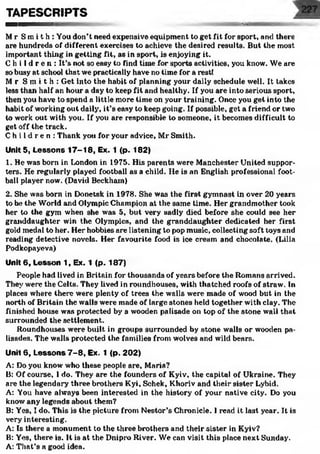
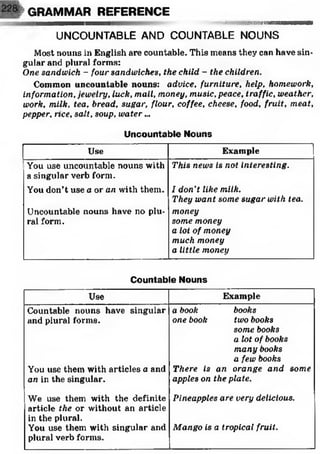
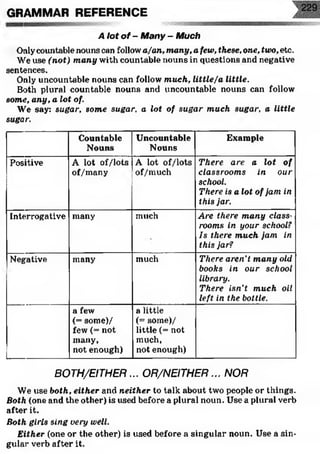
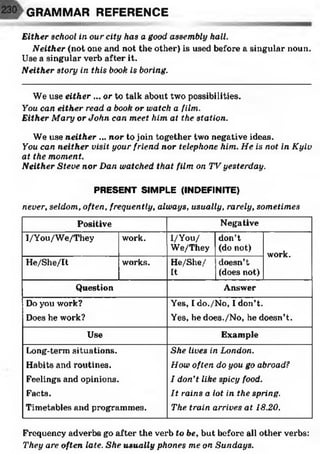
![PAST SIMPLE (INDEFINITE)
yesterday, last week, last month, last year, in 2000
GRAMMAR REFERENCE
Positive Negative
I/You/We/They answered. I/You/
We/They
didn’t
(did not)
answer.
He/She/It wrote. He/She/
It
didn’t
(did not)
write.
Question Answer
Did he answer? Yes, he did./No, he didn’t.
Use Example
Finished actions and situations
in the past.
I lived in Paris from 1980 to 1989.
How long ago did you meet her?
The Parkers travelled to the USA
last summer.
They didn’t drive a car yesterday.
Regular verbs in the Past Simple end in -ed.
We have to memorize the forms of the irregular verbs. (See Irregular
Verbs list on p. 242.)
Reading Rules -e d
[t] [d] [id]
after voiceless conso
nants except t
after vowels and
voiced consonants
except d
after t, d
watched answered decided
noticed skied painted
helped played nodded](https://image.slidesharecdn.com/72007-160621194318/85/7-_2007_-231-320.jpg)
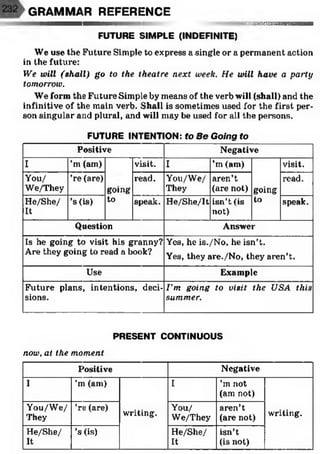
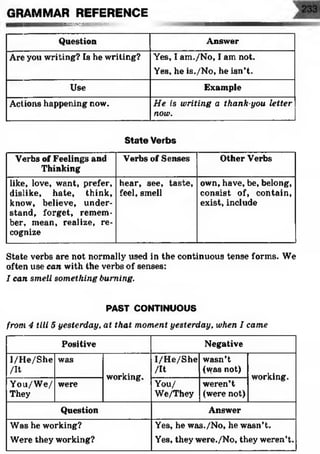
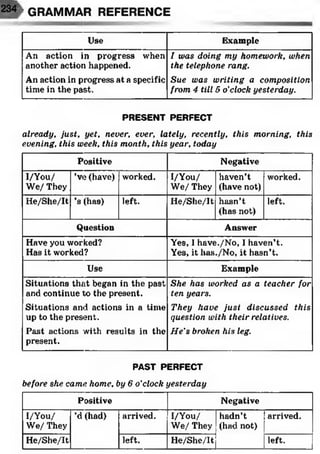
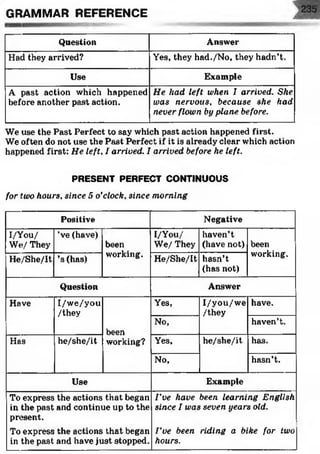
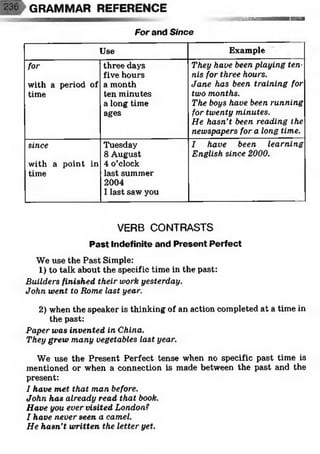
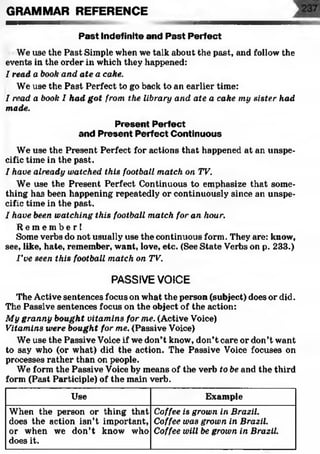
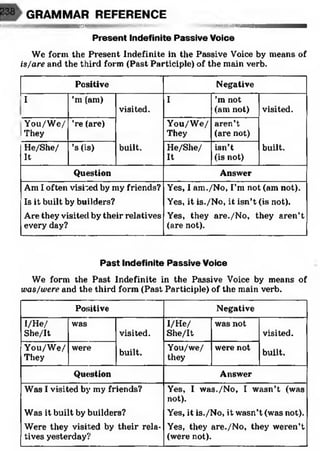
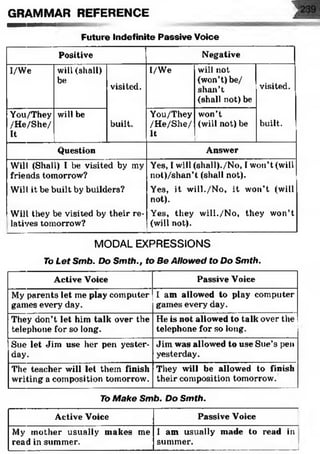
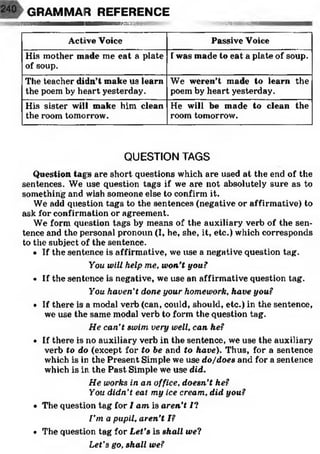
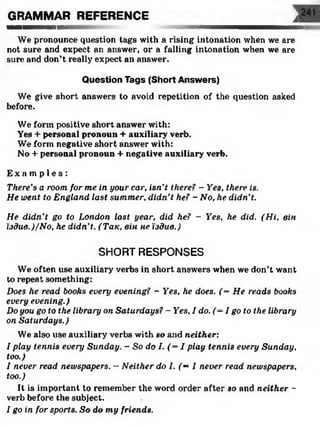
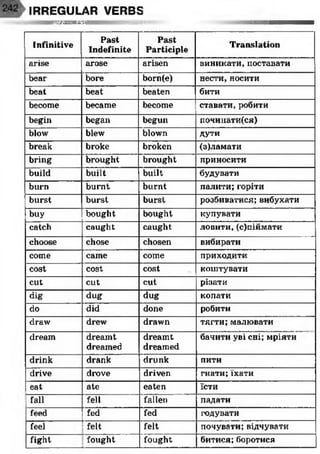
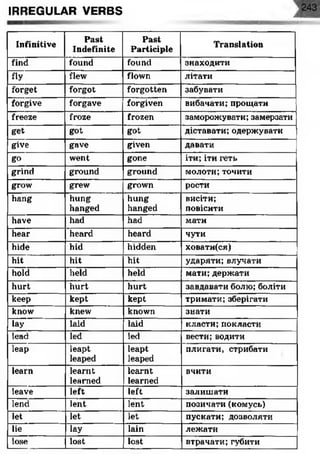
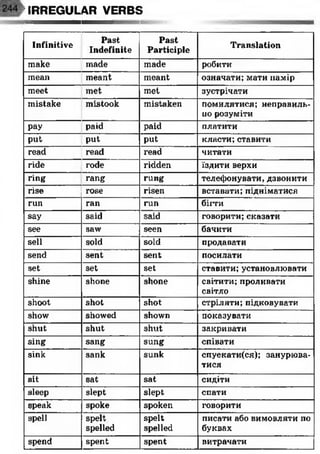
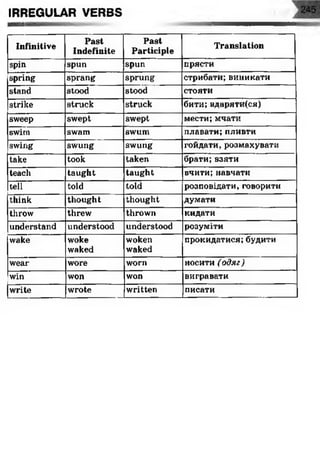
![VOCABULARY
A a
Aborigine [,асЬз'пфапі] корінний жи
тель Австралії, абориген
accompany [з'клтрзпі] супроводжу
вати
achievement [o’lfkvmont] досягнення,
здобуток
actor ['askto] актор
actress [’aektres] актриса
actual ['scktfual] дійсний, справжній
admire [od'maisl милуватись, захоп
люватися
adventure film [ad’ventfo ,fiim] пригод
ницький фільм
affect [o'fekt] впливати на
alert [з'Із:і] жвавий, меткий, пиль
ний
align [з'Іаіп] вишиковувати, шикува
тися)
allergic to [з’!з:фк] хто має алергію
на
allergist ['aebcfeiKt] алерголог
allergy ['геїзфі] алергія, підвищена
чутливість
amateur ['aimsts] аматор, любитель
amazing [з'теїгщ] дивовижний, вра
жаючий, чудовий
ambulance ['aiirbjabns] швидка допо
мога
anaesthetic [,£en3s'0 ctik] знеболюваль
ний засіб, наркоз
ancestor [’eensssca] предок, прабатько
angle [’аедді] кут
animation [,®ni'meijhj анімаційний;
захоплення, жвавість
appetizing ['aipitaizir)] апетитний,
привабливиіі
applaud [o'pb:d] аплодувати
application [.aepli'keijh] прикладання,
застосування
appreciate [s'prkjieit] цінувати, бути
вдячним за, розуміти
appreciation [o,pri:Ji'eiJh] оцінювання,
визнання
appropriate [a’proupriot] придатний,
властивий, відповідний
aquashoes [,a:kwo'Ju:z] водонепро
никні черевики
armband ['mnbtend] перев’язка (на
руку)
artefact ['adifekt] пам’ятка, худож
ній витвір
artificial [,a:ti'fijl] штучний
as busy as a bee [oz 'bizi ,sez з 'bi:] пра
цьовитий як бджола, роботящий
aspirin t'a:spnn] аспірин
assist in [s'sist] допомагати, брати
участь у
attacker [з’Пекз] нападаючий
attitude ['aetitjird] відношення, став
лення
audience f'o:dbns] публіка, слухачі
auditorium [,зхІі'(о:гізт] зала, ауди
торія
avoid [s'void] уникати
aware [3'wes] обізнаний
Bb
background ['bickgraund] задній план,
тло, фон
baking cup ['beiknj клр] формочка для
випічки
ballet ['Ьжіеі] балет
bar [ba:] перекладка, спорт, колода
barbecue ['bcrbikju:] барбекю
barrel ['Ьаегзі] діжка
baseball [’bcisbod] бейсбол
basketball backboard ['baiskitbo:!
rb£ckbo:d] баскетбольний щит
beach [bi:tj] узбережжя
behave [bi'heiv] поводитись
beloved [bi'lAvd] улюблений
beneath [bi'ni:0 ] внизу, нижче, під
beyond [bi'jond] по той бік, за межа
ми, поза
billboard ['bilbo:d] афіша, дошка ого
лошень
blame [bleim] докоряти, ганити, зви
нувачувати
bleed [bli:d] пускати кров; кровото
чити
bleeding [’blkdiQ] кровотеча
blood [bUd] кров
boil [boil] кип’ятити, варити
bone [Ьзип] кістка
boots [bu:ts] бутси](https://image.slidesharecdn.com/72007-160621194318/85/7-_2007_-246-320.jpg)
![nom
VOCABULARY
■ ■ м н м в н ю «
bored fbo:d] що нудьгує
box office ['boks ,ofis] білетна каса
boxing gloves ['boksiQ ,qlAVz] боксер
ські рукавички
break into applause [’breik into o'pb:z]
аплодувати
breathe lbri:d] дихати, передихнути
broken [’Ьгзикзп] розбитий
buffet ['bufei] буфет
bump [Ьдтр] зіткнутися
burn [Ьз:п] опік
by birth [bai 'Ьз:0 ] за походженням
C c
call [ko:l] викликати, кликати
candlelight ['k;endl lait] штучне освіт
лення, сутінки
carbohydrates [,ka;bou'haidrcits] вугле
води
carry on [,kaeri 'on] продовжувати
cart [ka:t] віз, повозка
cast [kcrst] склад акторів
catchy [’kactji] захоплюючий, приваб
ливий; що запам’ятовується (про
мелодію)
cater [’keito] догоджати, забезпечу
вати
cheer up [фзг'лр] заохочувати, підба
дьорювати
cheerful ['tjiofl] бадьорий, веселий
cheerleader ['tfio,li:do] капітан під
тримки (спортивної команди)
choke [tfauk] вдавитися; задихатися
chop [tjbpj дрібно нарізати
chopper [tjnpo] ніж, колун
chorus ['ko:ras] хор
chronic ['kronik] хронічний
chunk [фг)к] шматок, кусень
cinnamon ['sinonvan] кориця
clay [klei] глина
coach [koutj] тренер
coincide [.ksum'said] збігатися
cold tablets [,k3uld 'tzcblits] таблетки
від застуди
combination [.knmbi'ncijn] сполучен
ня, поєднання
combine [ksm'bain] об’єднувати, змі
шувати, комбінувати
comedian [ka'mkdian] комедійний ак
тор, комік
comedy I'komodi] комедія
compete in [kom'pkt] змагатися в
competitive [k3in'pet3tiv] конкурую
чий, що змагається
complain about fkam’plem) скаржити
ся на
complication [,knmpli'keifn] усклад
нення
comprise [kom'praiz] включати, скла
датися з
confident ['kmifidant] упевнений; той,
що заслуговує па довіру
confuse [knn'fjirz] змішувати, збивати
consecutive [ksn'sekjsuv] послідовний
constant ['knnstsntj постійний
construct [kon'stivkt] споруджувати
contain [kon’tein] містити
convenience [ksn'vimions] зручність
convince Ikon’vins] переконувати
cookery book f'kukori ,buk| кулінарна
книга
correspond to [,koi3'spmidJ відповідати
cough drops I'knfdrops] краплі (льодя
ники) від кашлю
cough syrup ['kof ,sirop] сироп від
кашлю
counter ['kaunto] робоча поверхня;
стійка, прилавок
countryside ['клпиікаїсі] приміська те
риторія
courageous [ko'rcicfcos] сміливий, від
важний
crock [kmk] горщик, глиняний посуд
crowded f’kraudid] переповнений, пов
ний
curtain call ['k.j:tn кз;1] поклон, вик
лик на біс
curve [k3:v] крива
D СІ
damage ['dæmicfe] зіпсувати, пошко
дити, зашкодити
damper ['dæmpo] авст рал. прісний
корж
dander ['dændo] шерсть (тварини), що
випадає](https://image.slidesharecdn.com/72007-160621194318/85/7-_2007_-247-320.jpg)
![f VOCABULARY
/літ» ШЯЮЖШ-.ЯУ
deal w ith [di:lj мати справу з, спілку
ватися
d e fe n c e [di'fens] захист, оборона
d e fin e [di'fain] визначати, встановлю
вати
d e lig h te d w ith [di'laitid] задоволений
(чимось)
d e liv e r [di'livo] розносити
d e m o n s tr a te ['demonstreit] демонстру
вати, доводити
d e m o n s tr a tio n [,demon'streiJh] показ
d e n tis t ['dentist] зубний лікар, стома
толог
d e p e n d o n [di'pend] залежати від чо
гось
d e p ic t [di'pikt] змальовувати, опису
вати
d e s p ite [di'spait] не зважаючи па, поп
ри, не дивлячись на
d e te r m in e [di'lj:min] визначати, вста
новлювати
d ia g n o s e ['daiognouz] ставити діагноз,
діагностувати
d if f ic u lt ['difikall] скрутний, тяжкий
d ig [dig] конати
d is a b ilit y [,diso'bik>ti] неспромож
ність, непрацездатність
d is g u s t in g [dis çiAStir)] огидний, не
приємний
d is p o s a l [di'spsuzl] розпорядження
d o m in a te [’dmnmeit] домінувати, пе
реважати
d o n a tio n [dot/neifn] дарунок, пожерт
вування
d u b b in g ['dAbip] дубляж
Е е
e a r r in g ['юпі)] сережка
e a s e [i:z] легкість, спокій
e a s y -g o in g [,i:zi'gouii}] безтурботний,
добродушний
e f f e c t [l'fekt] ефект, враження
e ffo r t ['efat] зусилля, спроба
e m b r o id e r [îm'broids] вишивати
e m b r o id e r e d [îm'broidad] вишитий
e n c h a n te d [in'tfa:ntid] зачарований
e n c o u r a g e [іп'клпф] підбадьорювати,
заохочувати
e n c o u r a g e m e n t [іп'клпфтіопі] підба
дьорювання
e n lig h t e n [in'laitn] висвітлювати,
просвітлювати
e n t e r ta in [.ento'tein] розважати
e n t h u s ia s t ic [m,0ju:zi'£cstik] захопле
ний
e n t h u s ia s t ic a lly lin,0ju:zi'aeslikli] за
хоплено
e n tr a n c e f'enirons] вхід, вступ
e n v ir o n m e n t [in'vaironmont] оточення
e q u ip [l'kwip] облаштовувати, облад
нувати
e x c it e d [ik'saitid] збуджений, схвильо
ваний
e x c it e m e n t [ik'saitmont] хвилювання,
зворушення, збудження
e x p e r t [’ekspsd] знавець, експерт
e x t r e m e ly [ik'stiimli] вкрай, надзви
чайно, дуже
eye d ro p s fai 'drops] краплі для очей
eyesight ['aisait] зір
F i‘
fa b u lo u s [Taibjalas] міфічний, леген
дарний, казковий
f a ir [feo] ярмарок
f a m ilia r [fo'milio] знайомий
fa n [fan] вболівальник
f e a t u r e f ilm ffirtfo ,film] художпій
фільм
f e s t iv e ['festiv] святковий
fe v e r ['fi:vo] жар, лихоманка
f illin g ['fiho] наповнювач, начинка
f ilm m a k in g ['film.meikiri] створення
фільму
fin [I'm] плавник, ласт
fir m [f3:m] фірма
f it n e s s [’fitnis] фітнес, натренованість
f le x ib ilit y [.flekss'biloti] мобільність
flic k e r [ fliko] блимати, мерехтіти
flo w e r b e d ['flauobed) клумба
f o llo w ['fnlau] іти (за кимось), пе
реслідувати
fo o tb a ll k it ['futbo:! kit] футбольне спо
рядження
f o r t u n a te ly [’fxtjbnatli] на щастя
fo y e r f'fbici] фойє](https://image.slidesharecdn.com/72007-160621194318/85/7-_2007_-248-320.jpg)
![VOCABULARY
■■■HI »III II ІІІІІГІ............................
fragrant ['freujront] запашний
freak [fri:k] дивак
fuel ['fjuiol]заправляти, живити; пальне
full of [ft>l]сповнений
furthermore [,Гз:бз'то:] до того ж,
крім того, більш того
Gg
gain [gem] заробляти, отримувати,
досягати
gargle [4ju:g1] полоскати (горло)
gather ['д;едз] збирати, зривати
germ [с($з:т] мікроб, бактерія
giant I'cfeaiont] велетень
gifted ['giftid] талановитий, обдарова
ний, здібний
give a helping hand f'giv з ’lielpiij
'htend] допомагати
glance [glu:ns] погляд
glorify [rglo:nfai] вихваляти, прикра
шати
goggles ['gnglz] окуляри для пла
вання
grab [дпеЬ] хапати; швидко їсти
grain [qrem] зернинка, піщинка,
дрібка (солі)
greenish-blue ['gri:nij blu:J зеленувато-
блакитний
grill [дні] гриль, смажити на грилі
grind up [gniind 'лр] молоти, товкти
guideline fgaidlain] керівництво до
дії
gurgle [’дз:д1] булькання, дзюрчання
H h
hall [ho;I] зал, зала
have a great interest in цікавитись
have someone’s tooth pulled out [,puld
'aotj виривати зуб
hay |hci] сіно
heart [ha:t] серце
heat fliirt] жар, спека
heating pad ['hi:tip p;ed] грілко
helmet [’hehnit] шолом, каска
hemisphere ['hemisfioj півкуля
herbal medicines ['hsrbol medscinz]ліки
з трав
heritage ['lienmfe] спадщина, спадок
herring ['herig] оселедець
hip [hip] стегно, поперек
historical [hi'slnrikl] історичний
hit [hit] хіт
hit smb. on the back [hit] стукнути
когось по спині
hockey stick ['hoki ,stik] ключка для
гри в хокей
holy ['hooli] святий, священний
honestly ['»nastli] чесно
hoop [hu:p] обруч, кільце
hunger [’luriga] голод
І І
ice pack ['ais pick] пузир з л ь о д о м
illusion [і'Іизп] ілюзія, враженпя
immigrant [’imigrant] імігранг
impression [im'prejn] враження
improve [im’pru:v] удосконалювати,
поліпшувати
in case [in 'kcis] у разі
in need [in 'ni:d] у разі потреби
infected [in'fektid] інфікований, зара
жений
influence ['influons] вплив, впливати
injury ['mdpri] пошкодження, пора
нення, травма
inspire [in'spaio] надихати
install [in'sb:l] встановлювати, монту
вати
instead [in'sted] замість
interact [.intor’aekt] взаємодіяти
interaction [.intor’tekjh] взаємодія
interior [in'tiaria] внутрішній
interval ['intovl] антракт, перерва
invader [in'vcids] окупант, загарб
ник
involve [m'vDlv] втягнути
involved [m'vnlvd] зайнятий
J j
jar [cfca:] банка
jaw [cfea] щелепа
jazz band ['cfetez’bEend]джаз-бенл, джа
зовий оркестр
judgment ['ффпзш] вирок, рішен
ня, судійство
junk food ['фі)к fu:d] некорисна їжа](https://image.slidesharecdn.com/72007-160621194318/85/7-_2007_-249-320.jpg)
![VOCABULARY
K k
keep fit [ki:p 'tit] тримати, зберігати
форму
kit [kit] набір, ранець
knock [rrnk] стукати
knowledge [’nolicfe] знання
]L1
landmark [’laendmak] віха, орієнтир,
визначне місце
landscape [’ltendskeip] ландшафт
laughable ['laifobl] смішний
laughingly f'lcufigli] смішно
laughter 1'1а:ііз] сміх, регіт
law (b:J закон
lean [Іі:п] нежирний, пісний
leech [li:tf] п’явка
leisure ['ІЄ30] дозвілля
lifestyle f'laifstail] стиль життя
light [lait] світло
limb [lim] кінцівка
linen flininj полотно, білизна
link [lirik] звязок, ланка
liquid ['hkwid] рідина
lobby ['ІоЬІ] велике фойє
logo ['hucjou] логотип
look through [luk ’0 ru:] продивитись,
переглянути
lotion ['toujn] лосьйон, примочка
lumpy [Члтрі] грудкуватий
M m
majestic [ma'cfcestik] величний
majority [ma'tfeoroti] більшість
make regular tours [meik] проводити
регулярні тури
mean [mi:n] мати на увазі; означати
measured ['тсзос] обдуманий, розра
хований, зважений
medical checkup f'mcdikl ,ljek,p] ме
дичний огляд
memorial plate [то'тоігізі ,plcit] ме
моріальна дошка
mild [maild] легкий, м’який, незнач
ний
millennium [ті'Іспіот] тисячоліття
mix fmiks] змішувати, перемішувати
modern light system [mndn 'lait ,sistom]
сучасна система освітлення
modern sound system [mndn ’saund
,sistnm] сучасна звукова система
modem standard [mndn 'sttendad] су
часний стандарт, рівень, норма,
зразок
monument ['monjumontj пам’ятник
motion picture projector [.tnoofn 'piktfo
pro'tfeckta] кінопроектор
motivation [,mouti'veiJhj мотивація
mouth-watering ['matK),WD:toriij] дуже
смачний, від якого слина тече
movement f'muivmont] рух, перемі
щення
muffin pan ['nwfin ,рагп] лист, деко
для здоби
muffin ['тлГіп] здоба
mumble f'm,mblj бурмотати, мимрити
muscle ['irusll мускул, м’яз, сила
musical comedy [,mju:zikl 'knmadi] му
зична ЇСОМЄДІЯ
N n
nasal spray [’neizl sprci] спрей для носа
necklace ['neklis] намисто
neighbourhood ['neibohud] околиці,
сусідство
net [net] сітка
newsreel ['nju:zri:l] кіножурнал
niclmame f'mkneim] прізвисько
noisy ['noizi] шумний, галасливий
numerous [’njuimaras] численний
nutrient ['nju:triant] поживна речовина
G o
occasion [o'keijn] випадок, нагода,
оказія
occupation [,Dkju'peijn] заняття, фах
occur [o'kn:] траплятися, відбуватися
official [o'fijl] посадова особа, службо
вець
ointment ['ointmont] мазь
opening scene ['зирпір si:n] перша сце
на (кіносюжету, вистави)
open-minded [,oupn'maindid] відкри
тий, иеупереджений
opera ['oprnj опера](https://image.slidesharecdn.com/72007-160621194318/85/7-_2007_-250-320.jpg)
![VOCABULARY
■ и а п н п к si-
o p era h o u s e t'npro haus] оперний театр
o p e r a tio n [.opo'reifnl операція
o p p o n e n t [з'рзипзт] опонент, гравець
команди-суперника
o p p o r tu n ity [.врз'уілпзіі] можливість
o r c h e s tr a ['o:ktstr3]оркестр
o r g a n iz e ['зідзпаїг] організовувати
o u t-o f-th e -w a y p la c e s [,aut av da 'wei
'plcisiz ] віддалені місця
o u ts t a n d in g [aut'stasndig] видатний
P p
p a c k e d lu n c h [,p;ekt ’l.ntf) сніданок
у пакеті
p a d fpsed) наколінник; тампон
p a in fu l ['peinfl] болісний, болючий
p a in s h o c k ['pan Jbk] больовий шок
p a r te d fr o m [’pactid] окремо від
p a rticip a te in [pa'tisipat] брати участь у
p a s s o n [pu:s'on] передавати, поширю
вати
p a tie n c e [’peifns] терпіння
p a t ie n t [’peifnt] пацієнт, хворий;
терплячий
p a tio ['рапізи] внутрішній двір
p a tte r n ['рюш] зразок, взірець, мо
дель
p a v ilio n [po’viljan] павільйон
p e a c e p ip e ['pis раїр] трубка миру
p e a l [pi:l] вибух (сміху)
p e n ic illin [,pem'silin] пеніцилін
p e r fo r m [рзТз:т] грати, ставити
(п’єсу)
p ic k le d ['pikld] солоний, маринований
p ic tu r e s q u e [.piklfo'resk] мальовничий
p ill [pi!] таблетка, пігулка
p la n t [plcnnt] садити, саджати
p la y [pleij п’єса
p o le v a u lt ['pool vo:lt] стрибки з жер
диною
p o lle n I'pnlon] пилок
p o llu te d [po'lurtid] забруднений
p o p u la r ['popjolo] популярний
p o r tio n [‘pojn] порція
p o t [potJ каструля, горщик, каза
нок
p o u r [рз:] наливати, розливати
p o w e r ['раиз] сила, міць, енергія
practise [’pnektis] застосовувати, зай
матись
p r a is e [preiz] хвалити
p r a y e r [ргез] молитва
p r e m ie r ['premia] першокласний, кра
щий
press a clean piece o f c lo th ['pres з ,kli:n
'pis av 'klo0 ] притиснути чистий
бинт
p r e v e n t [pn'venl] запобігти, відвернути
p r o d u c tio n [ргз'йлк/п] показ, поста
новка, виробництво
p r o te in [’ргзигі:п] білок, протеїн
p u b lic ['рдЬІік] громадський, держав
ний
p u c k [рлк] шайба
p u p p e t ['рлрН] лялька
p u p p e t t h e a t r e ['рлріі ,0 ізіз] лялько
вий театр
p u r e e f'pjuorei] шоре
p u z z le d [’pAzld] здивований, сианте-
личений, збеитежений
Q q
quitfkwit] залишати, звільняти
R г
ra w [гз:] сирий
r e c o n s t r u c t io n [.itkon'strAkfn] рекон
струкція
r e c o r d ['reko:dj рекорд, запис
r e c o r d [n'ko:d] записувати
r e fe r e e [дсГз'гі:] судця, рефері
r e fr e s h m e n t s t a n d [n'frefmont ,stamd]
буфет
r e la x in g [ri'laeksiri] розслаблюючий
r e ly o n [ri'lai] покладатися на, довіряти
r e m a r k a b le [ri'ma:kobl] чудовий, диво
вижний
r e m in d o f [n'maind] нагадувати (про)
r e p e r to ir e ['repatwa:] репертуар
r e p r e s e n t [,repri'zcnt] представляти,
символізувати, зображати
r e p u t a t io n [,repju'tei/n] репутація,
слава
r e s e r v e fri'z3:v] резервувати, зберігати
r e s p e c t [ri'speki] повага
r e s p e c tin g [ri’spektip] відносно, щодо](https://image.slidesharecdn.com/72007-160621194318/85/7-_2007_-251-320.jpg)
![reveal [n’vi:l] відкривати
rim [nni] край, обід, оправа
roar [ro:] рикати
roll [rail] розгортатися (про події)
roll out [roul 'am] виповзти
royal [’roiol] королівський
ruin ['ru:in] руйнувати
running shoes і'гапіо Ju:z] черевики
для бігу
S S
salary ['siebri] заробітна платня,
плата
scald [skorld] опік (окропом або парою)
scenery ['siinori] декорації, пейзаж
schedule [’Jedjuil] розклад, графік
science fiction film [.saions 'fikjn ,film]
фільм жанру фантастика
screen [skriin] екран
script [skript] сценарій
seat [sill] місце; вміщувати
seed [si:d] зерно, насіння
select [si'lekt] вибраний, добірний
self-correction [fselfko’rek/n] самови
правлення (корекція, поправка)
sensation [sen'seijn] сенсація
service ['S3ivis] послуга
serving t's3:virj] порція
set goals ['set 'goulz] ставити цілі
settle ['sell] розташовувати
settlement ['setlmont] поселення
severe [si'vio] важкий, сильний
shake with [feik] трясти
shape [jeip] надавати певної форми
sheaf [fi:f] сніп, оберемок, в’язка
shock [jbk] шок, удар, струс
shot [jut] укол; знімок, кадр
shout [faut] вигук, крик
show [|зи] вистава, спектакль, показ
show particular interest in [Jou] про
являти зацікавленість у
snack [snack] легка закуска, під’їдок
sneeze [sni:z] чхати
snorkelling mask ['snoikolio 'mask]
маска для підводного плавання
souffle ['suiflei] суфле
sound-absorbing panel [saond ob'soibii)
,p;enl] звукопоглинаюче покриття
** VOCABULARY
•• » « я ш я ш и м
soupy [suipi] рідкий
special prop for popcorn ['spejl 'prop fo
'popkoin] спеціальна підставка для-
попкорну
speciality [,speJi'ffiloii] фірмова страва
spectator [spek’teito] глядач
speed [spi:d] швидкість
spikes [spaiks] кросівки з шипами
spinner [’spina] пряля
spirit ['spirit] душа, дух
split [split] солодка страва (з фруктів і
морозива)
sporting ['spoitiri] спортивний
sportsmanship f'spoitsmonjip] спортив
на спритність, чесність
spotlight ['spDtlait] вогні рампи, про
жектор для підсвічування сцени
sprinkle [’spripkl] бризкати, посипати
stage [steicfe] сцена
stamina [’staemins] витримка, витри
валість
star [sta:] зірка (також кіно-, теат
ральна зірка)
steep stands [‘slip 'staendz] амфітеатр
у формі сходів
stir [sta:] розмішувати
storytelling [’sto:ri,teliJj] переказ істо
рій, казок
stove [slow'] кухонна плита, піч
street-side ['strirt'said] бік вулиці
strength [strcijG] сила
stressful ['stresfl] стресовий
strip [strip] кінострічка
style [stall] стиль, манера
subtitles ['SAb'taitlz] субтитри
suburb [*$лЬз:Ь] передмістя
succession [sok'sejn] послідовність,
безперервний ряд
suck [&k]смоктати, ссати
suffer ['sAfo] страждати, терпіти
suitable ['sjuitobi] відповідний, підхо
дящий
supportive [so'poitiv] підтримуючий
swallow' ['swolou] ковтати, проковт
нути
swell [swcl] надувати, роздувати
sympathy ['simpo9i] співчуття, сим
патія](https://image.slidesharecdn.com/72007-160621194318/85/7-_2007_-252-320.jpg)
![T t
tablespoon [’teiblspu:n] столова ложка
tablet, ['tieblot] таблетка
take part in fteik po:t 'in] брати участь у
take the advantage of ['teik di
od'vamticfc ov] користуватись пере
вагою
takeaway box ['teikowei bDks] пакунок
з їжею па винос
teammate f'ti:m meil] гравець тієї
самої команди
tear [tea] рвати, зривати, розривати
teaspoon [4i:spu:n] чайна ложка
technical equipment f'tekmkl
I'kwipmont] технічне обладнання
technically f'leknikli] технічно
technique [tek'ni:k] техніка
technology [tck'iioloifei] техніка, тех
нологія
terrace ['tens] тераса
theatre [’Oiota] театр
theatregoer ['0ioto,gom] театрал
theatrical [0i4etnkl] театральний
thirst [Oa:st] спрага
though [дди] все-таки, однак, втім
thriving ['0raiviij] процвітаючий
through [0ru:] через, крізь
ticket Г'іікіі] квиток
ticket booth ['tikit bird] білетний кіоск
tie a bandage [Чаї з 'biendicfe] перев’я
зати, накласти пов’язку
tile [tail] кахля
time-speed event [’taim spi;d j'vent] зма
гання на швидкість
touch upon [UtJ'Jторкатися
traumatic [tro:'mietik] травматичний
treat with [tri:t] лікувати
VOCABULARY
. ж я я н п ш н а н в н ш
treat smb. [tri:t] ставитись до когось
treatment [4ri:tnionl] лікування, до
гляд, нагляд
U u
unforgettable [.лпІз'усізЬІ] незабутній
unspoilt [,,n'spoilt] незіпсований
up-to-date [,Apto'dcil] сучасний
urgent [<rj:cfcanl] нагальний, терміно
вий
usher ['.ф] білетер
V V
valuable [’vacljuobl] цінний
variety [vo’raioti] різноманітність
viewer ['vju:a] глядач
vitamin [’vitamin] вітамін
W w
war film ['wo: film] фільм про війну
w'aste of time ['wcist ov Чаші] марна
трата часу
wrater ['wo:to] поливати; сльозигися
waterhole l'wo:tohoul] водопій, екпа-
жина
well-known [pvel'noun] відомий, попу
лярний
western ['wcsion] вестерн, ковбой
ський фільм
wheat [wi:t] пшениця
whitewash ['waitwnf] білити
will [wil] воля, бажання
wipe [waip] протирати, витирати
wisp [wisp] жмуток, віхоть, віничок
wonderfully [‘WAiidafali] чудово](https://image.slidesharecdn.com/72007-160621194318/85/7-_2007_-253-320.jpg)